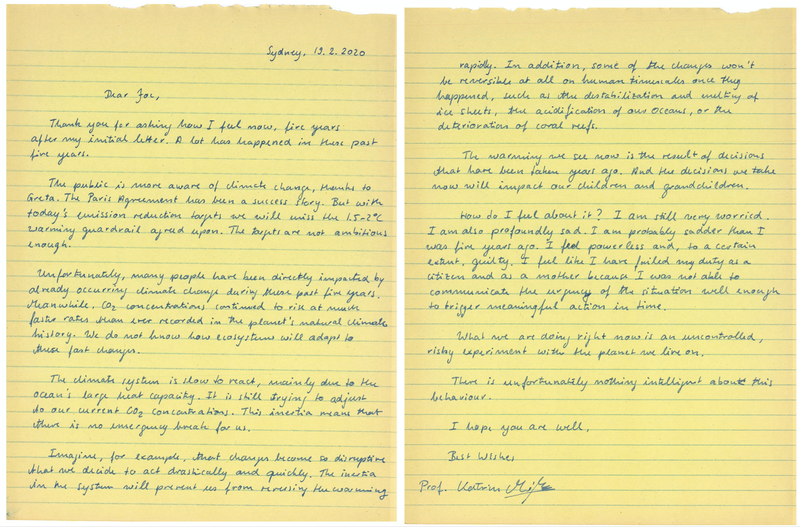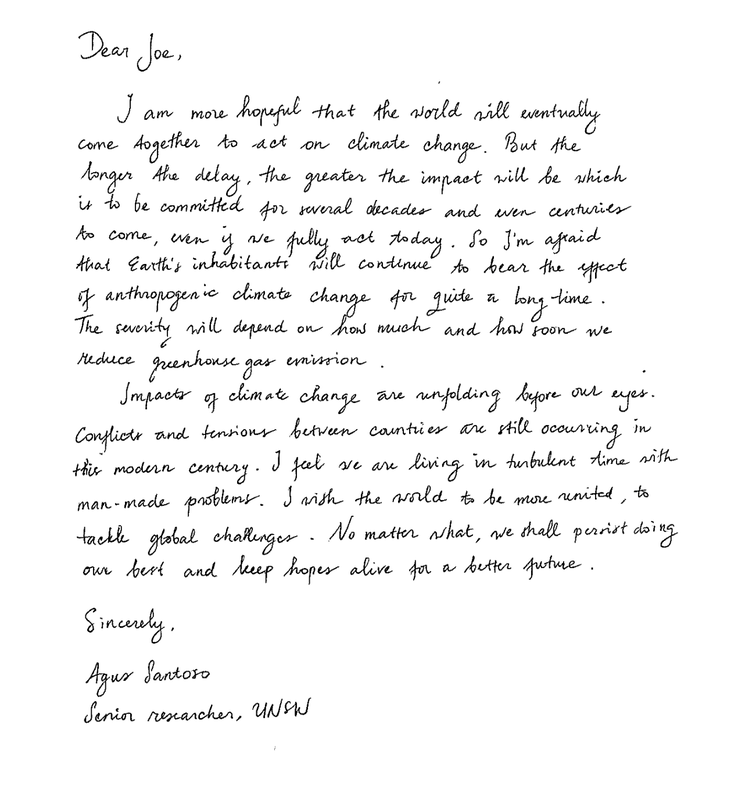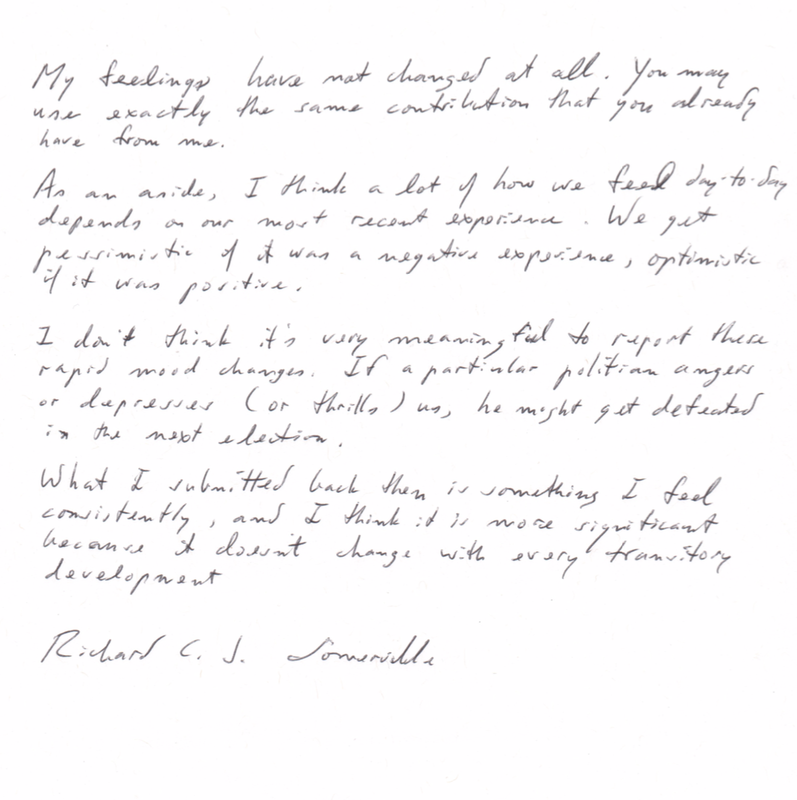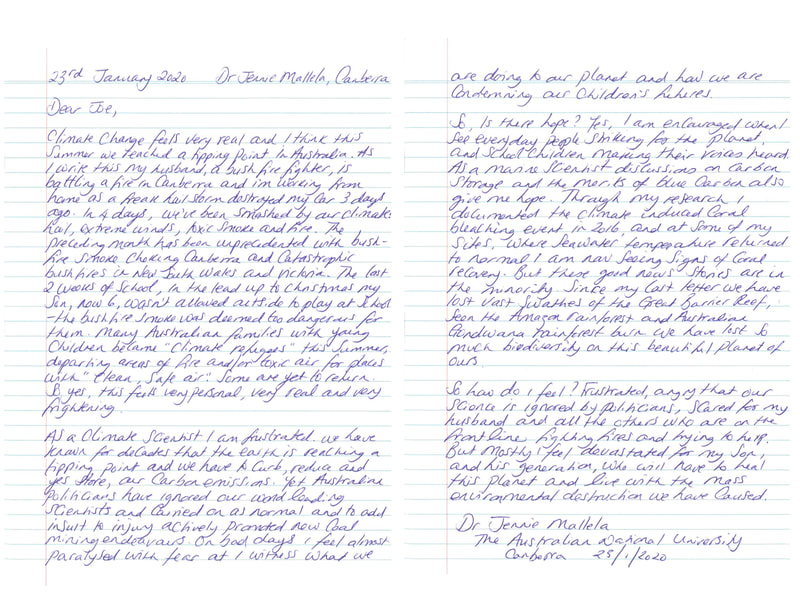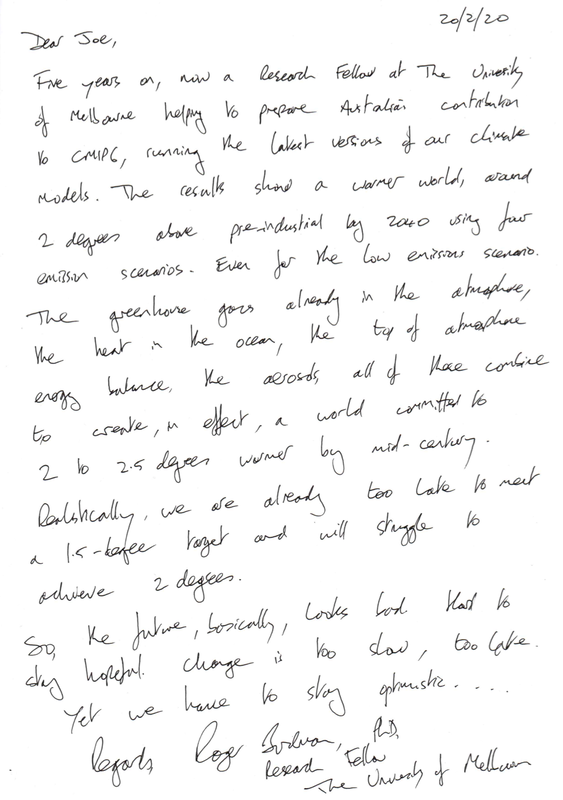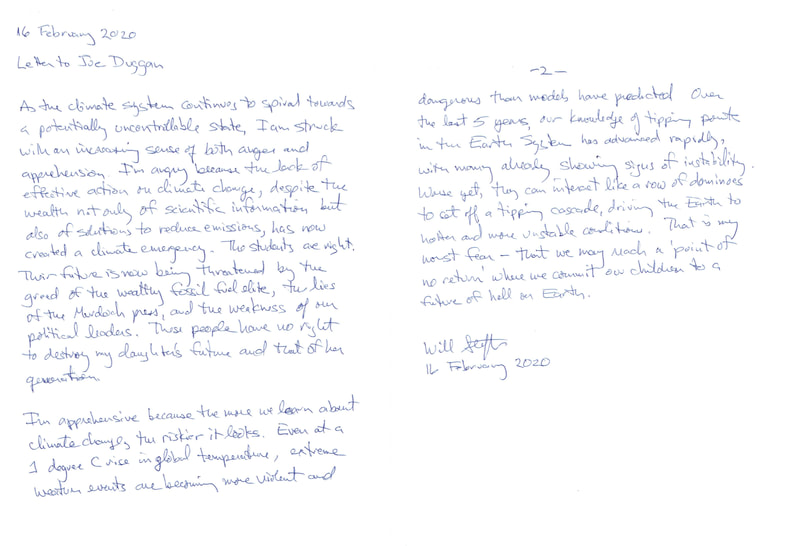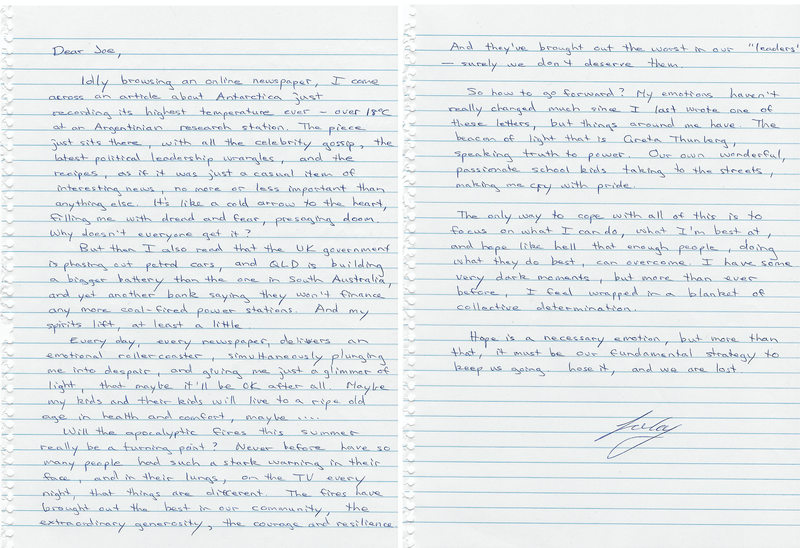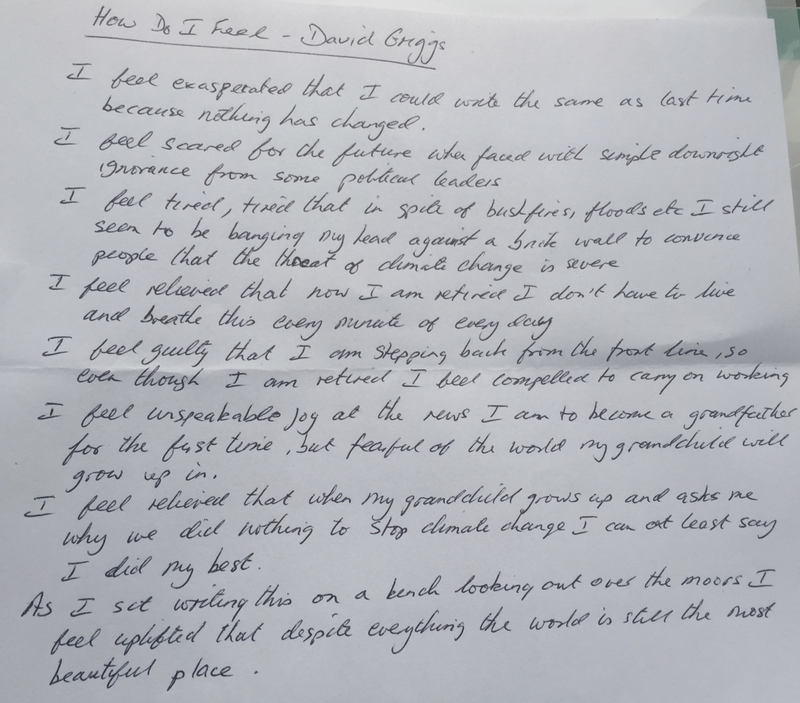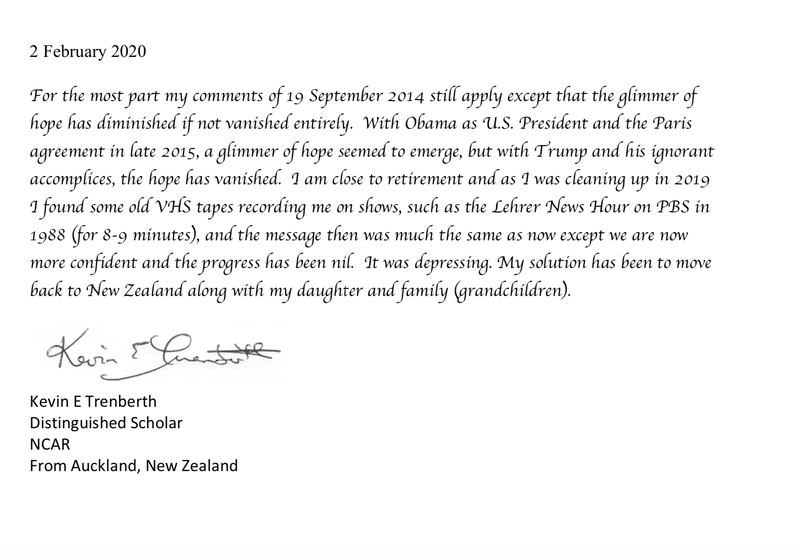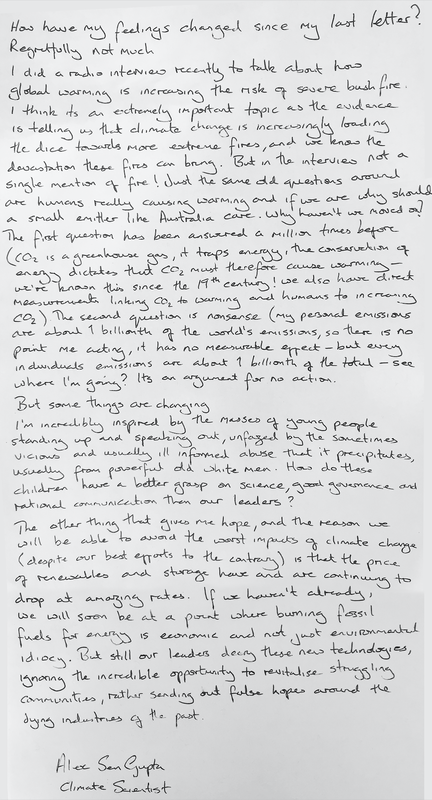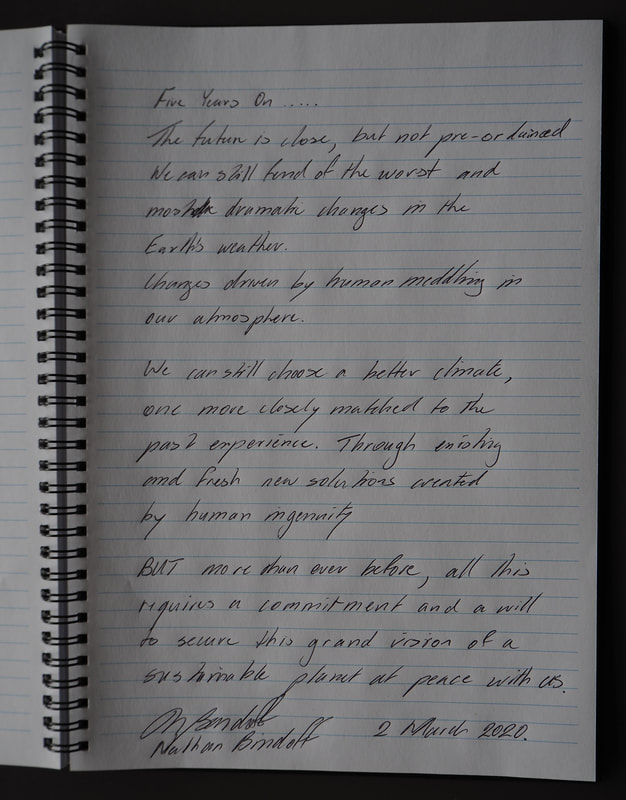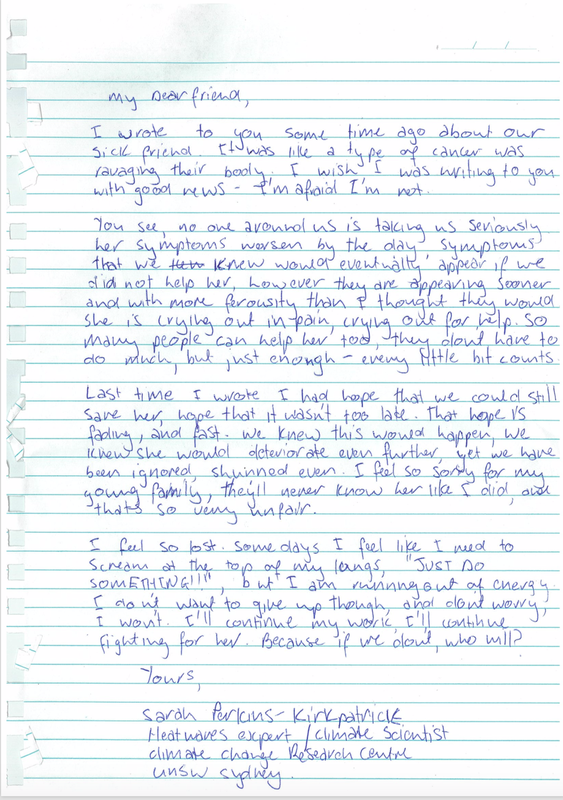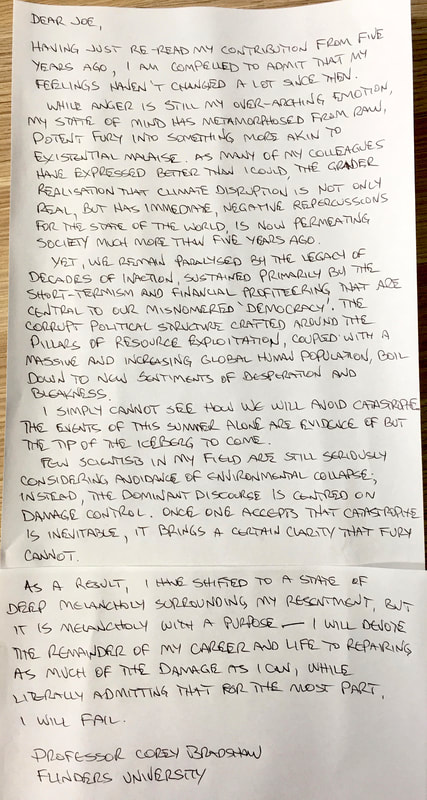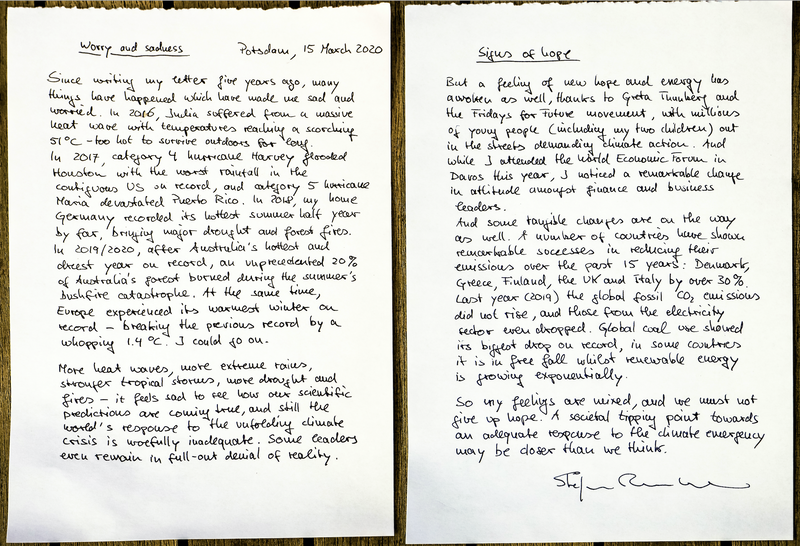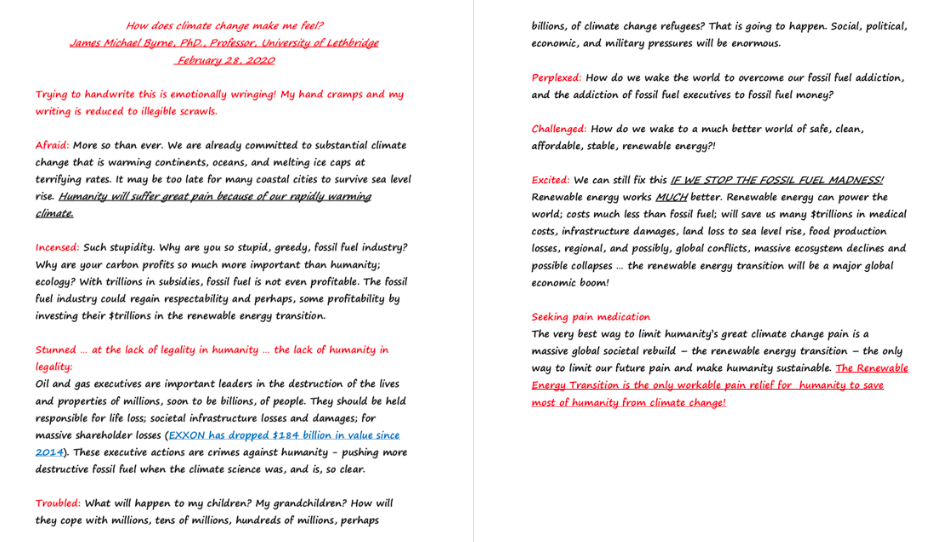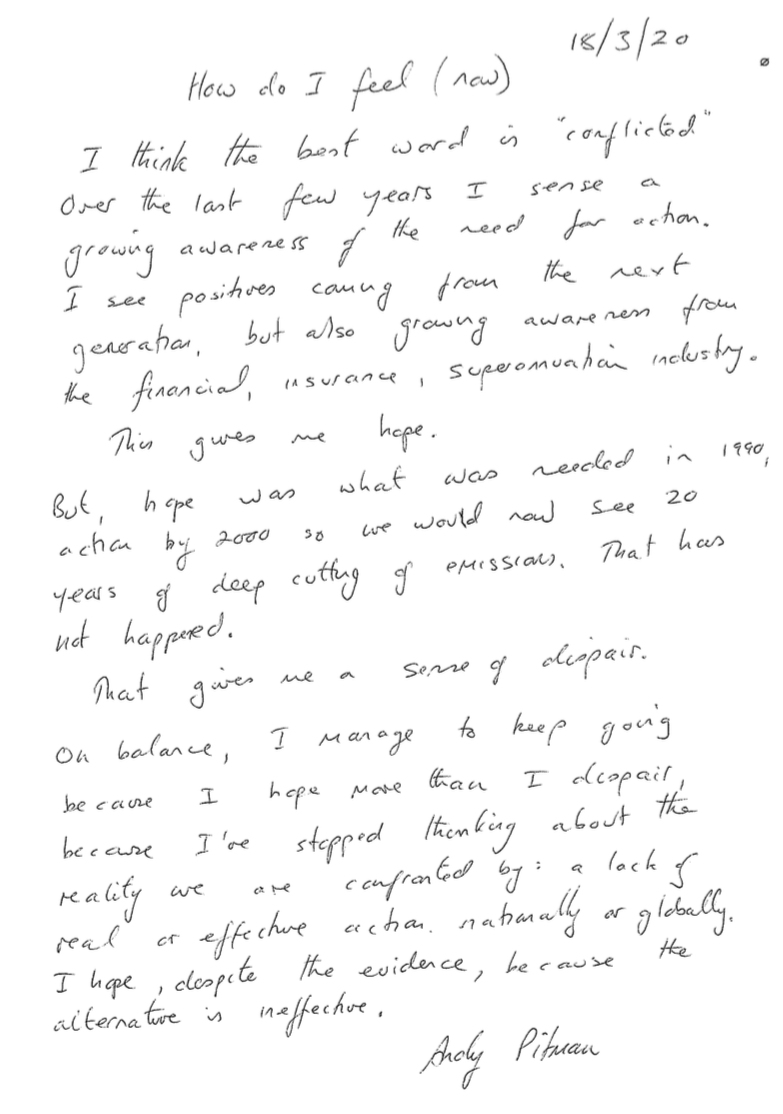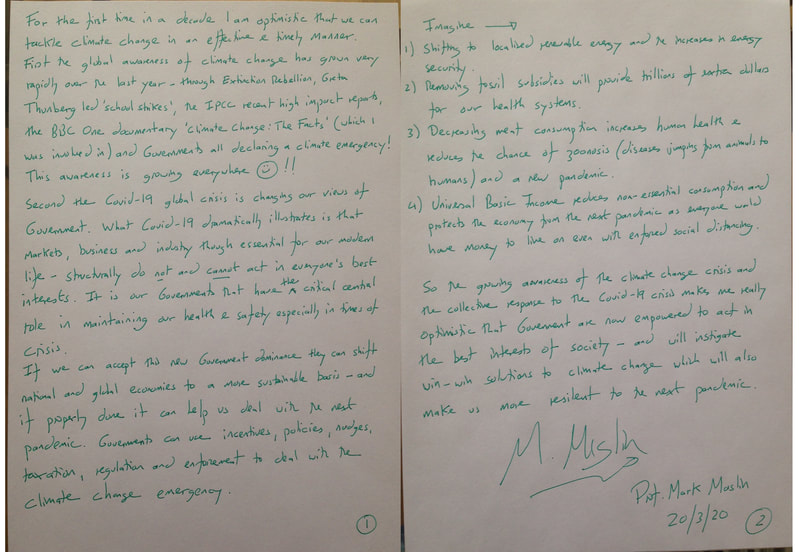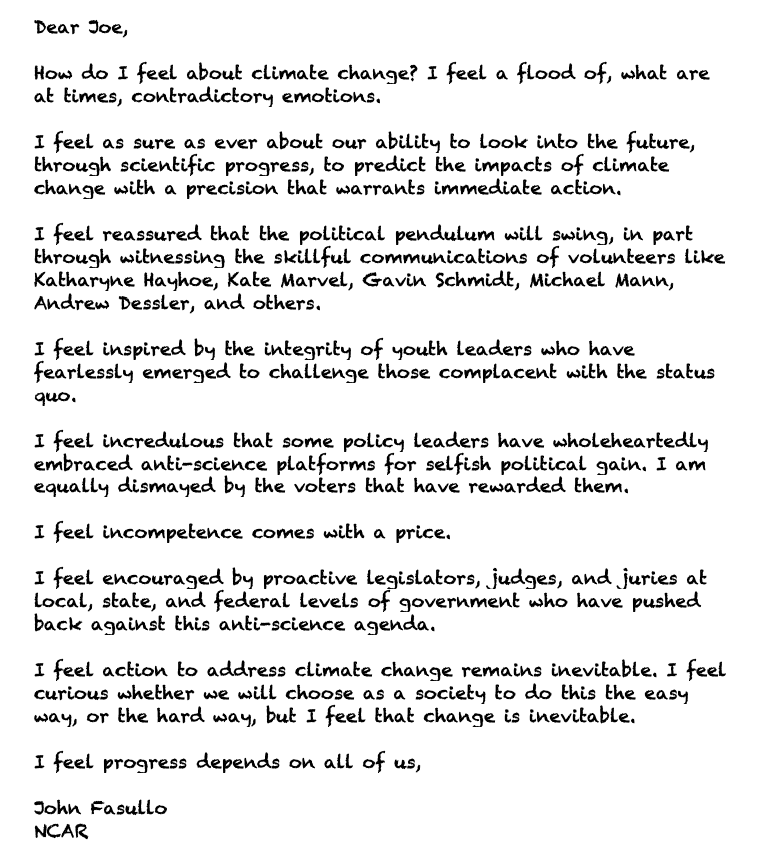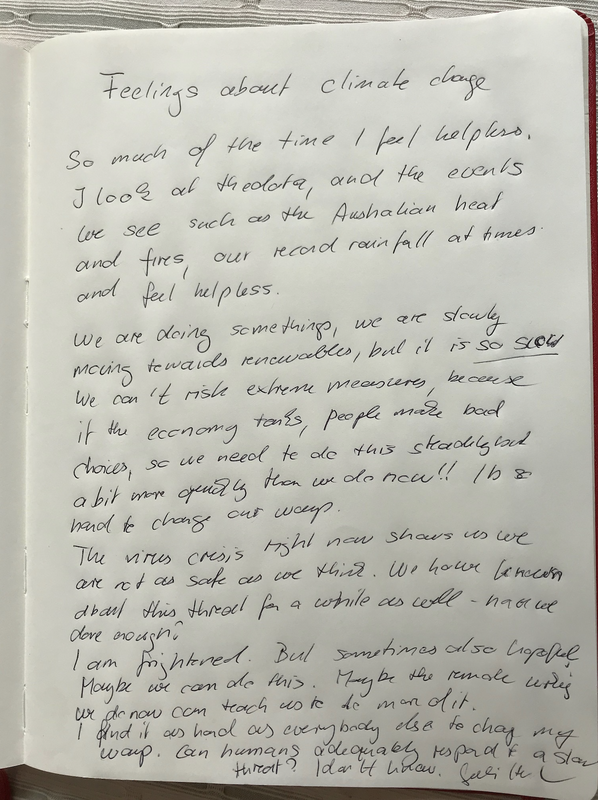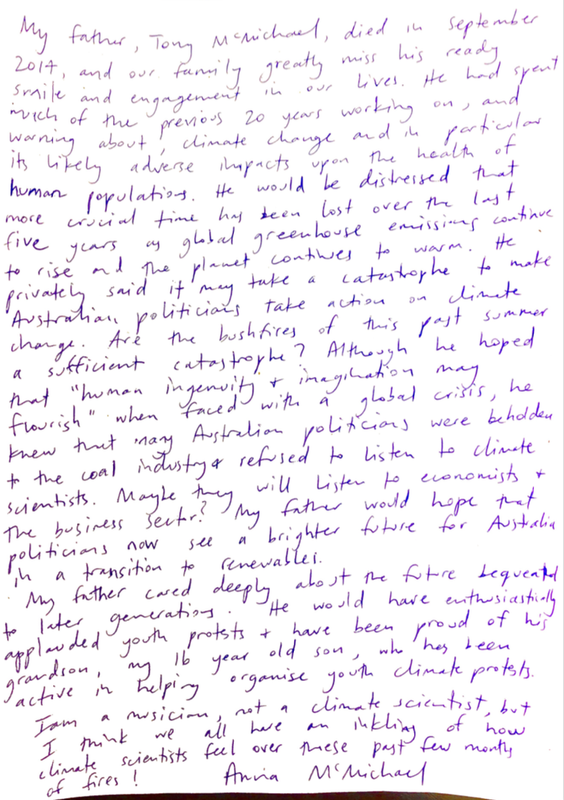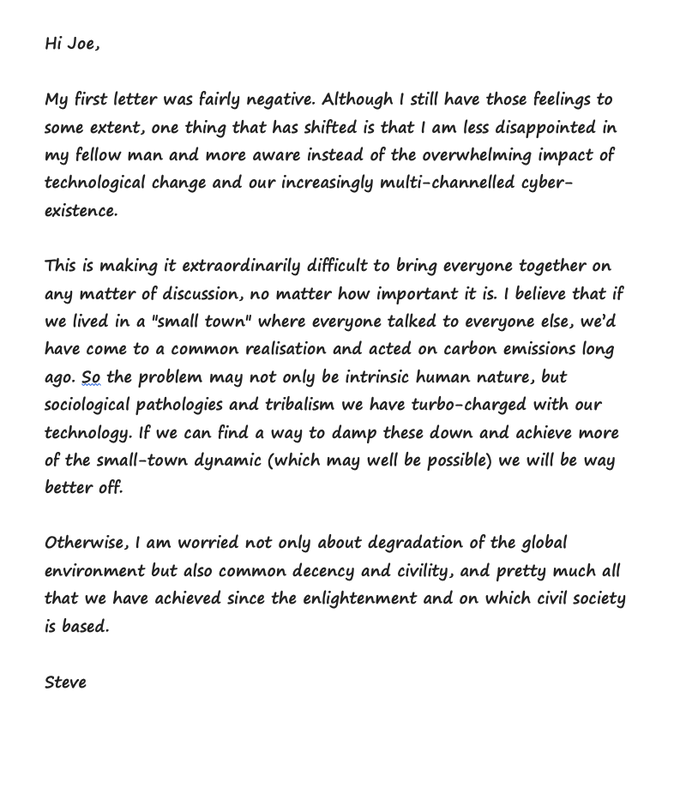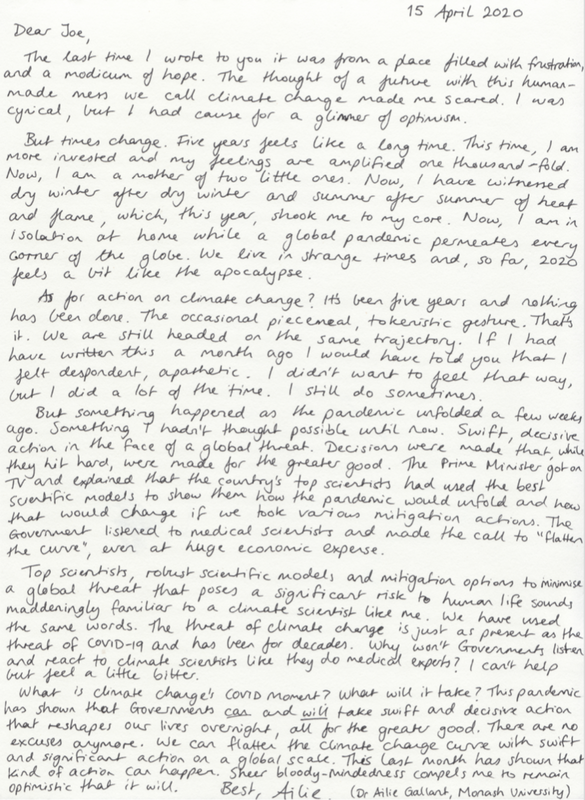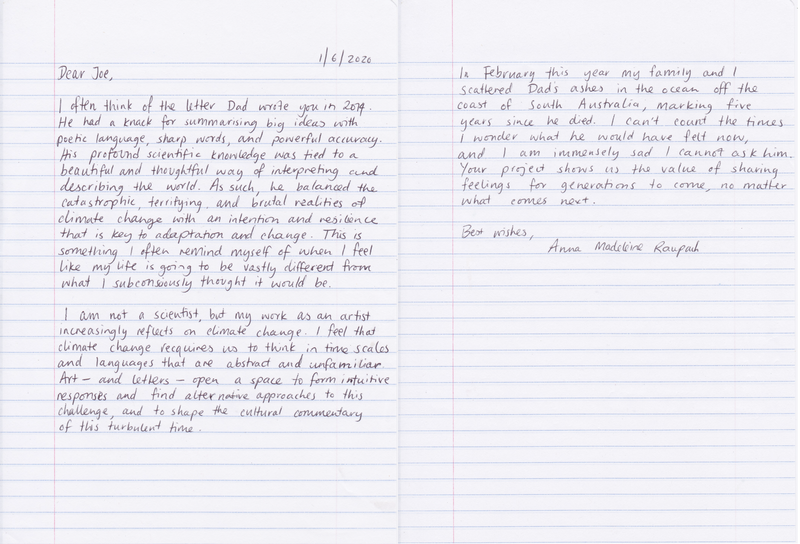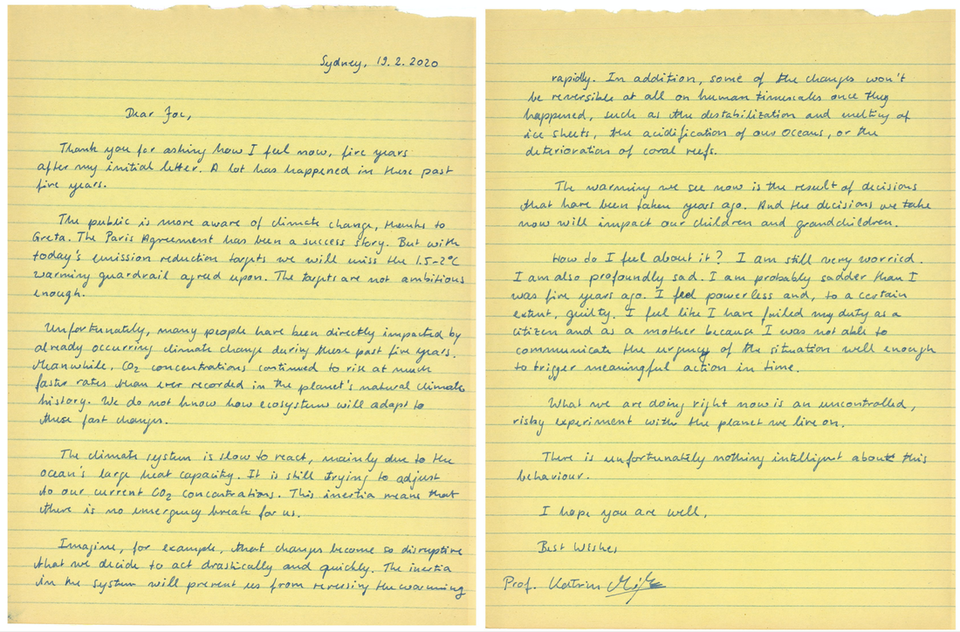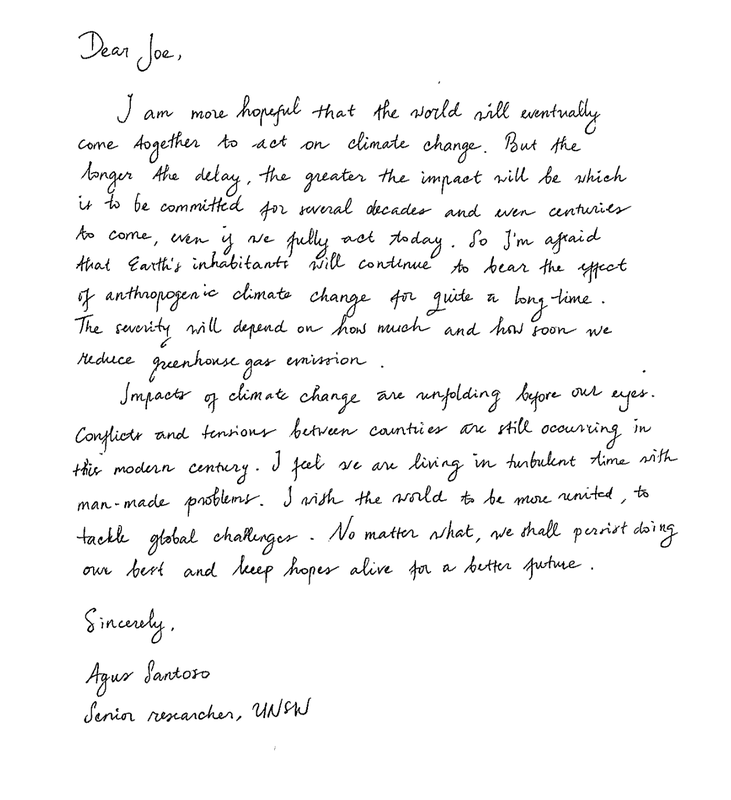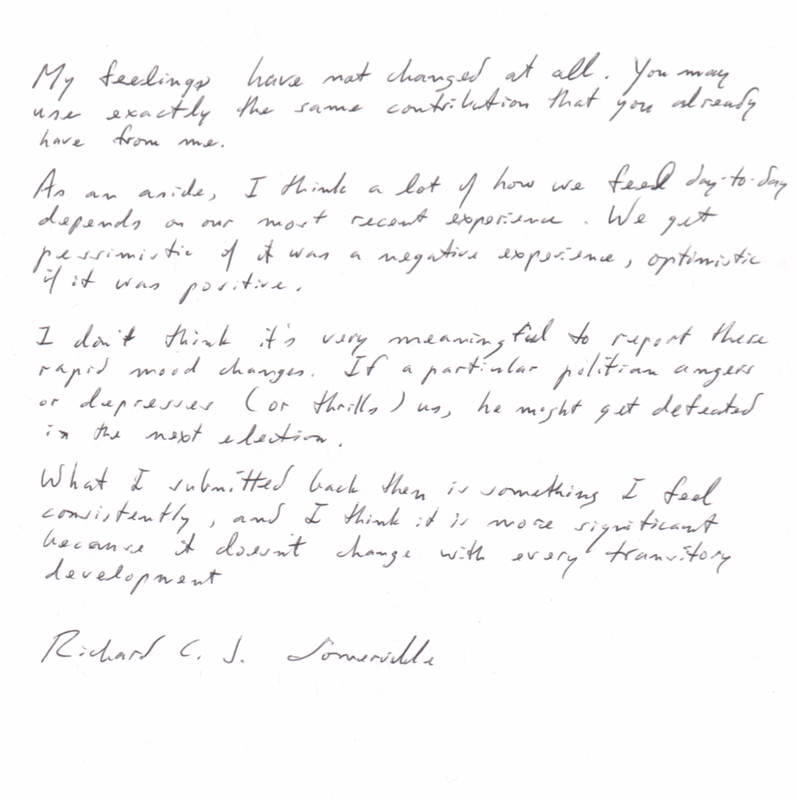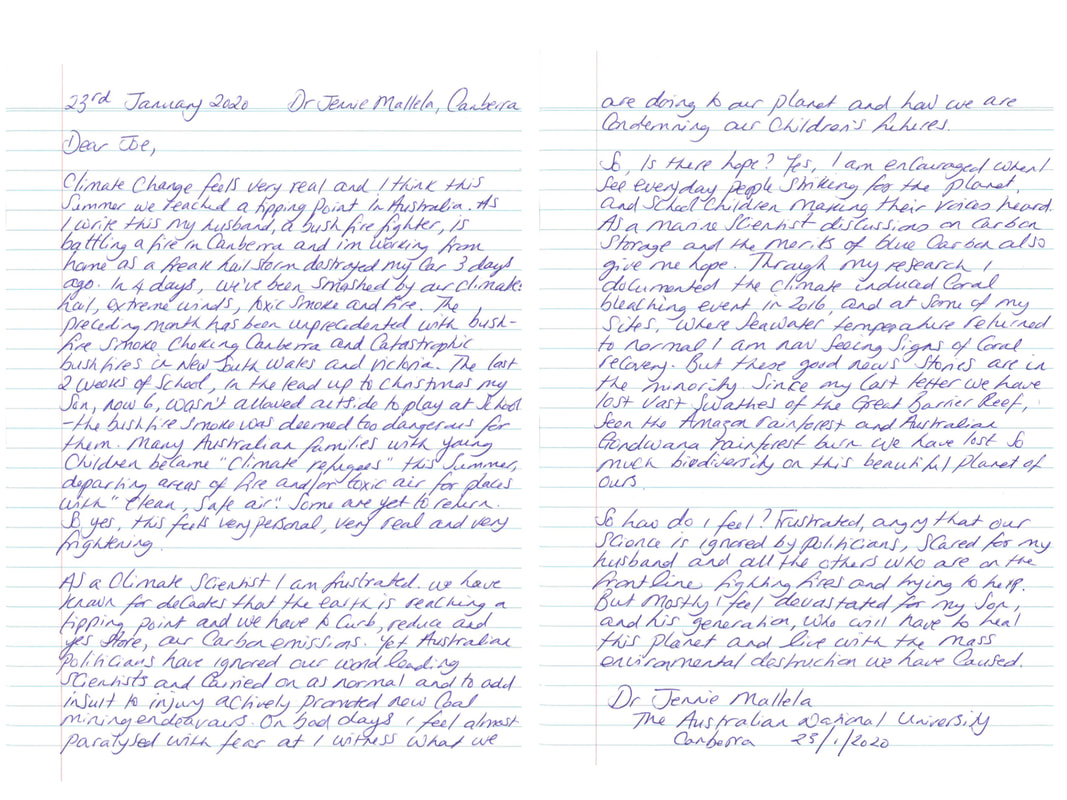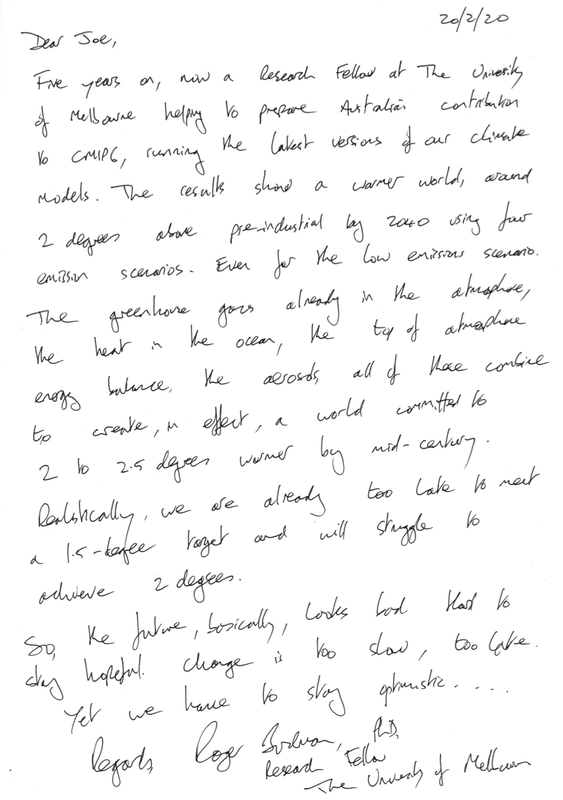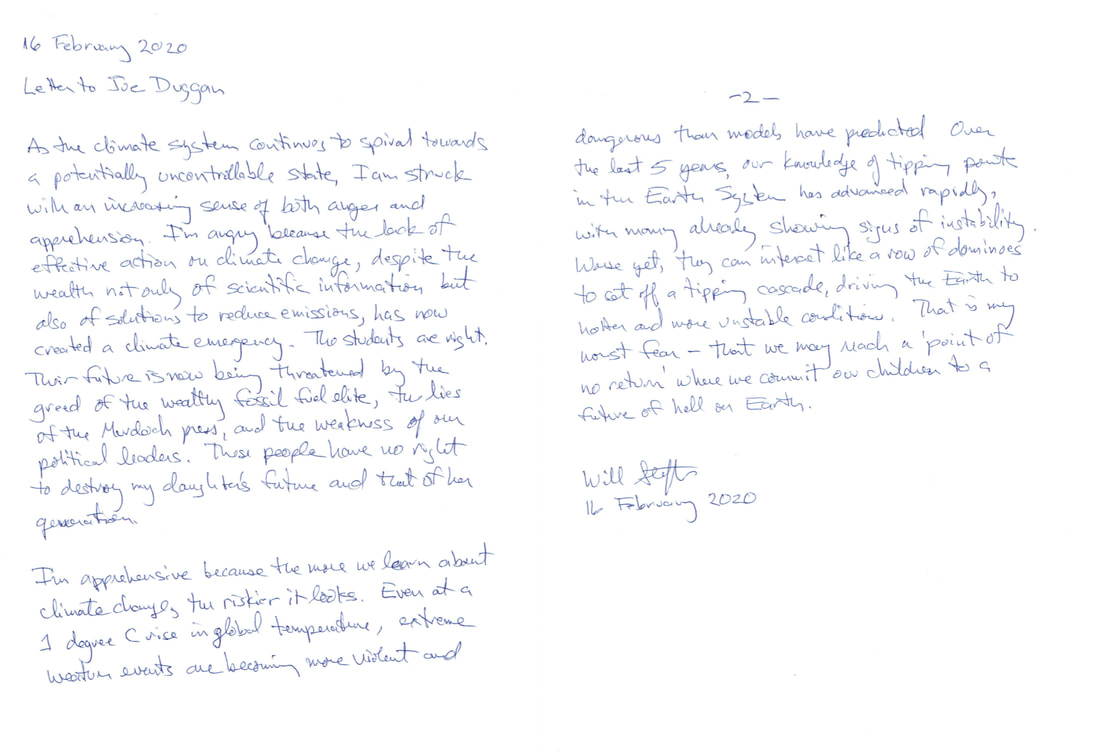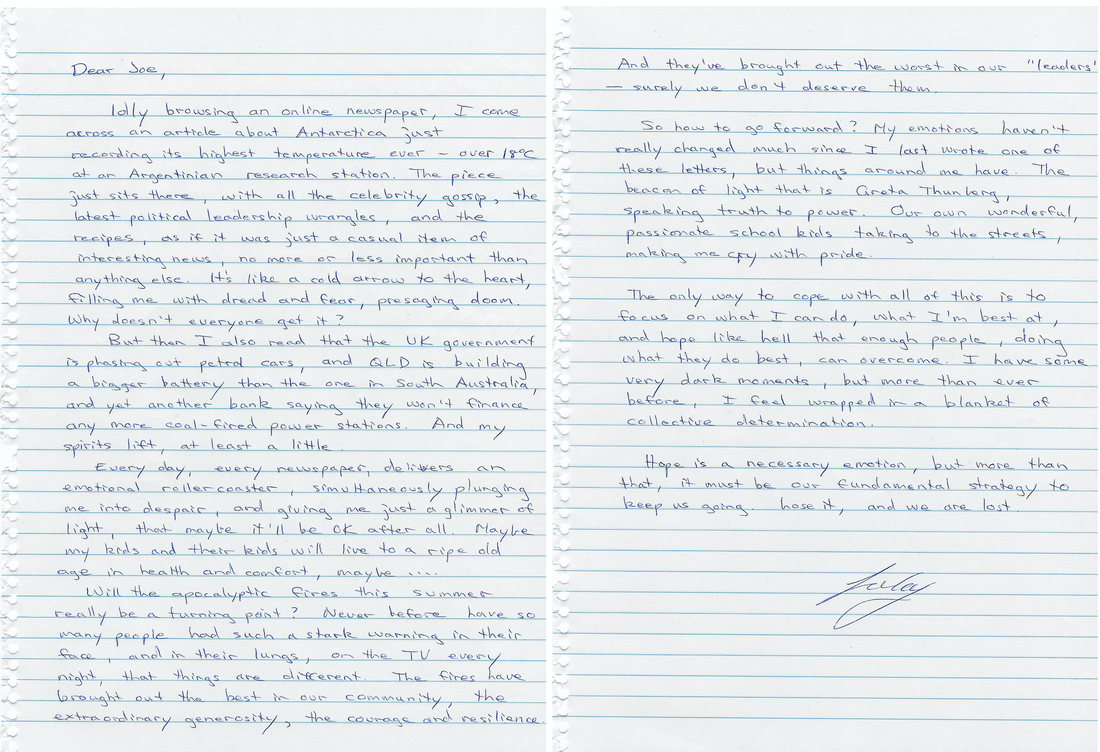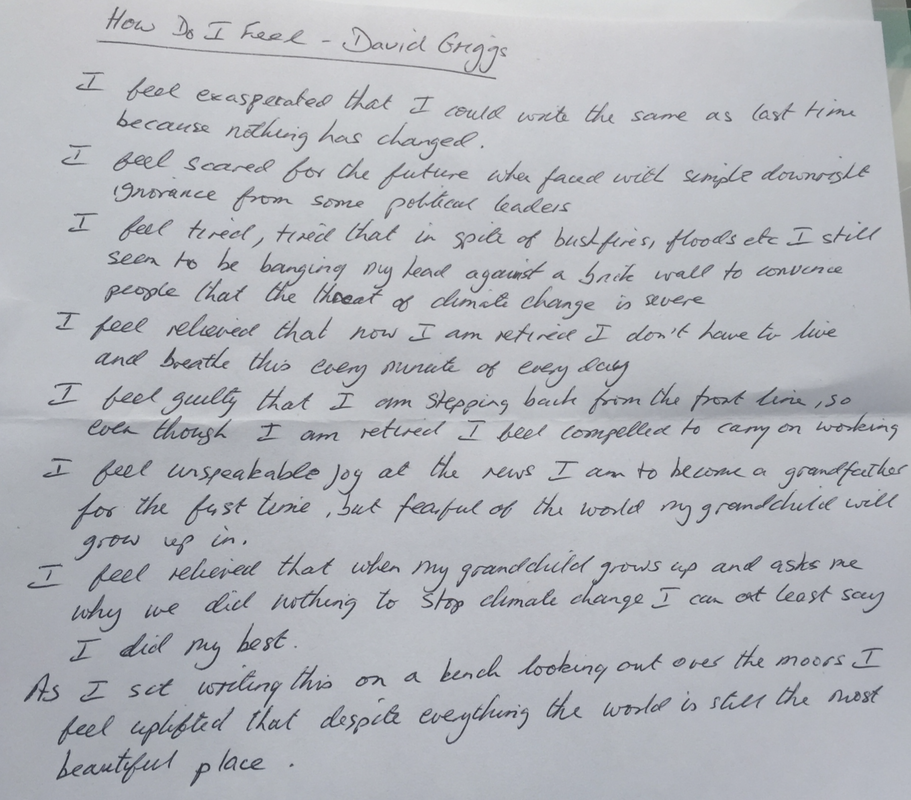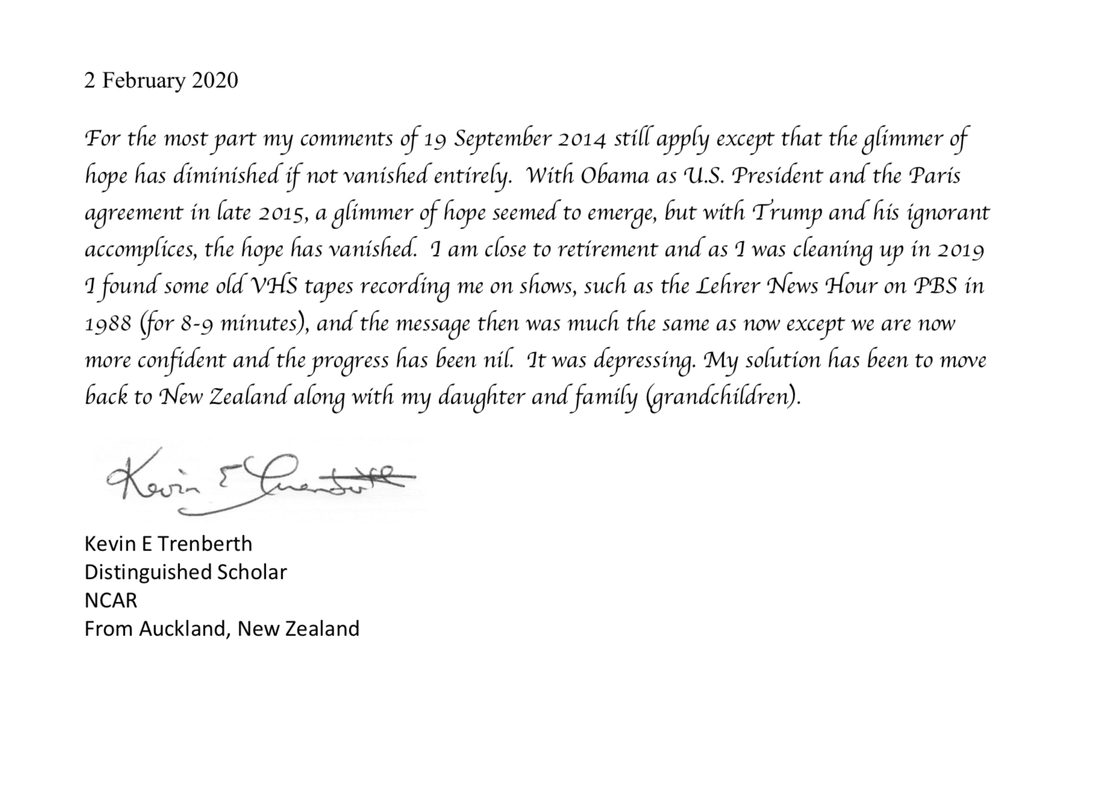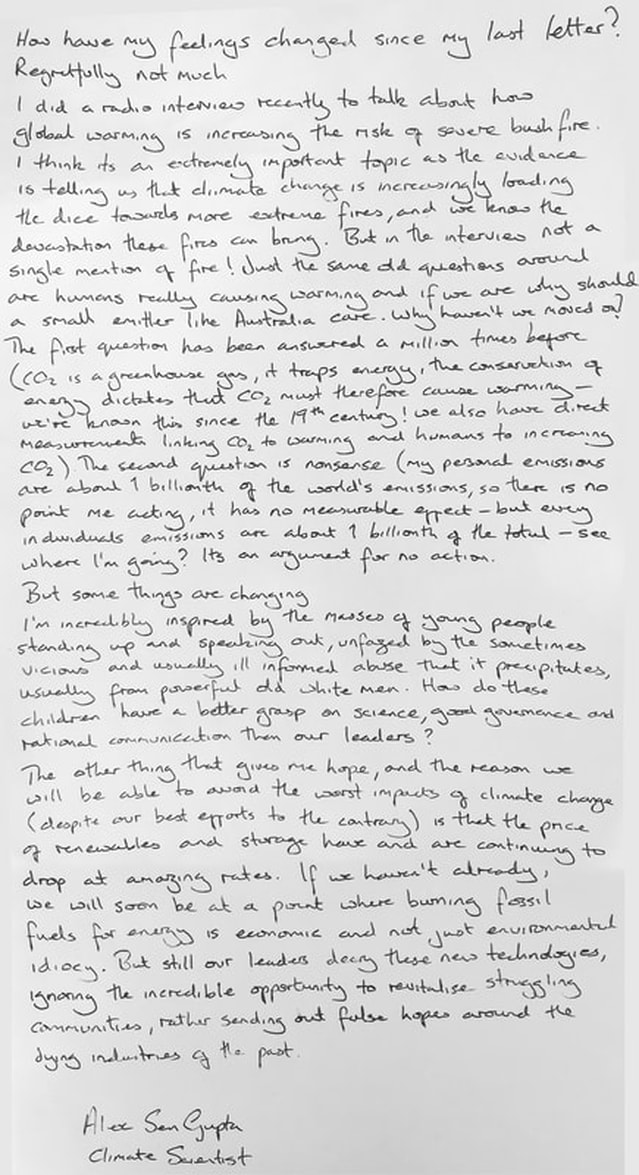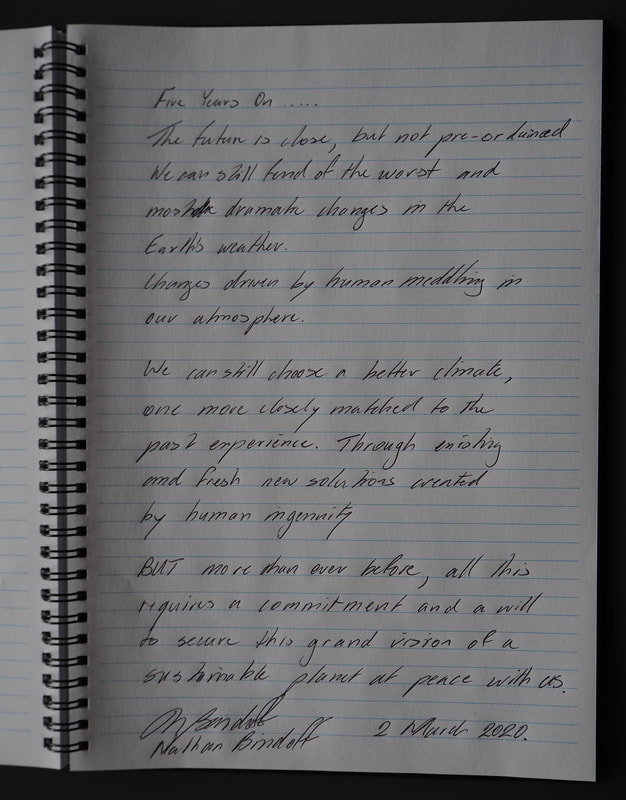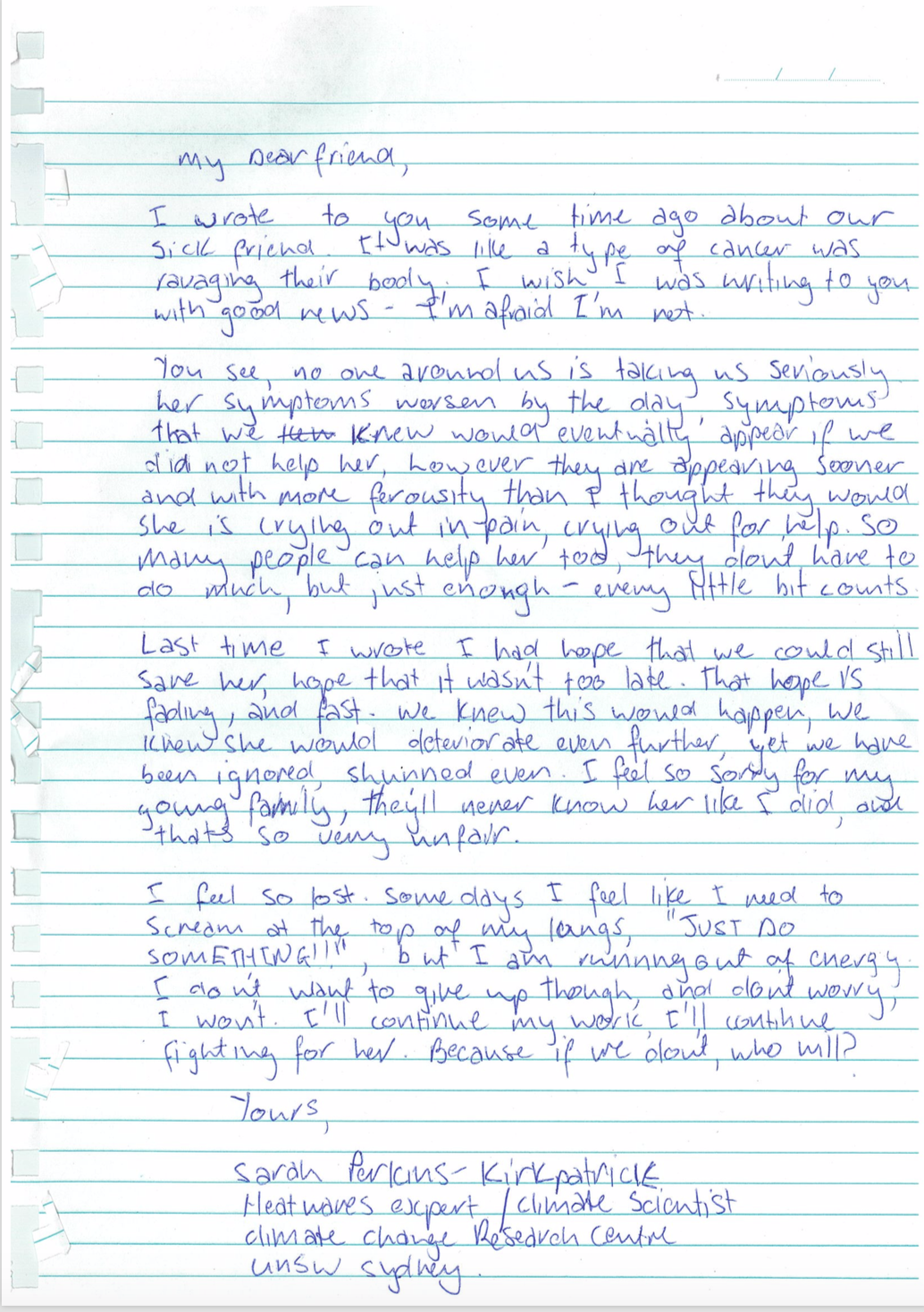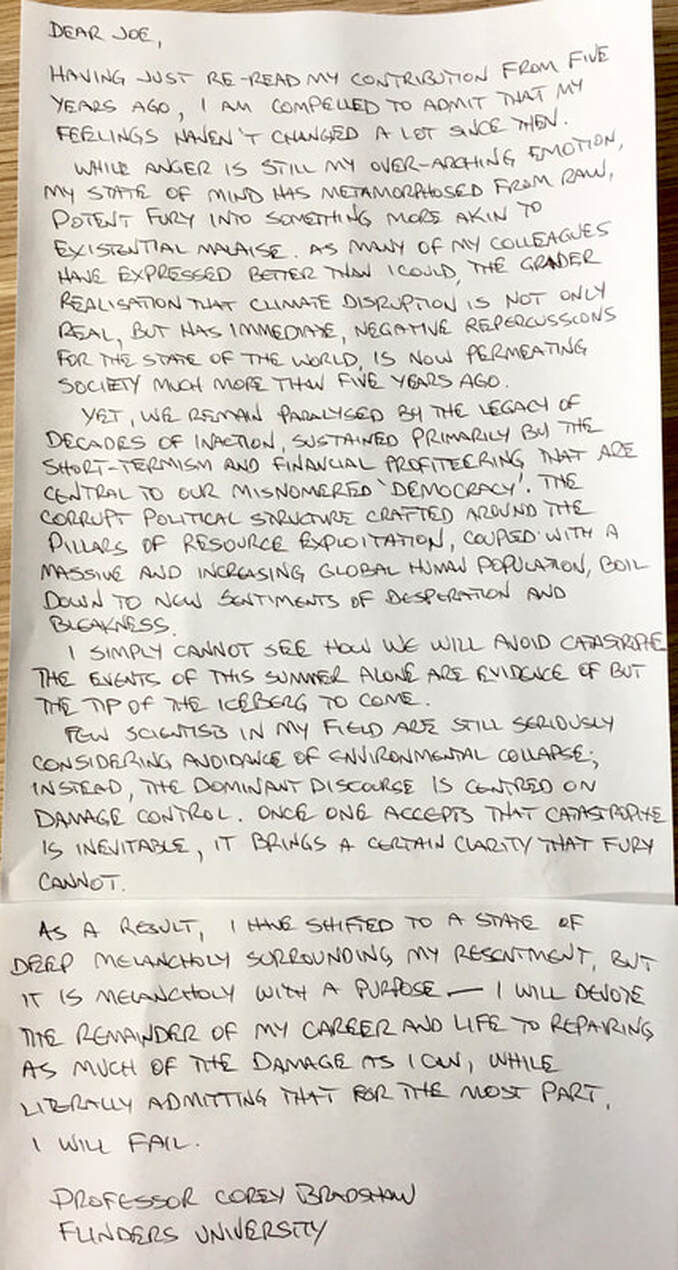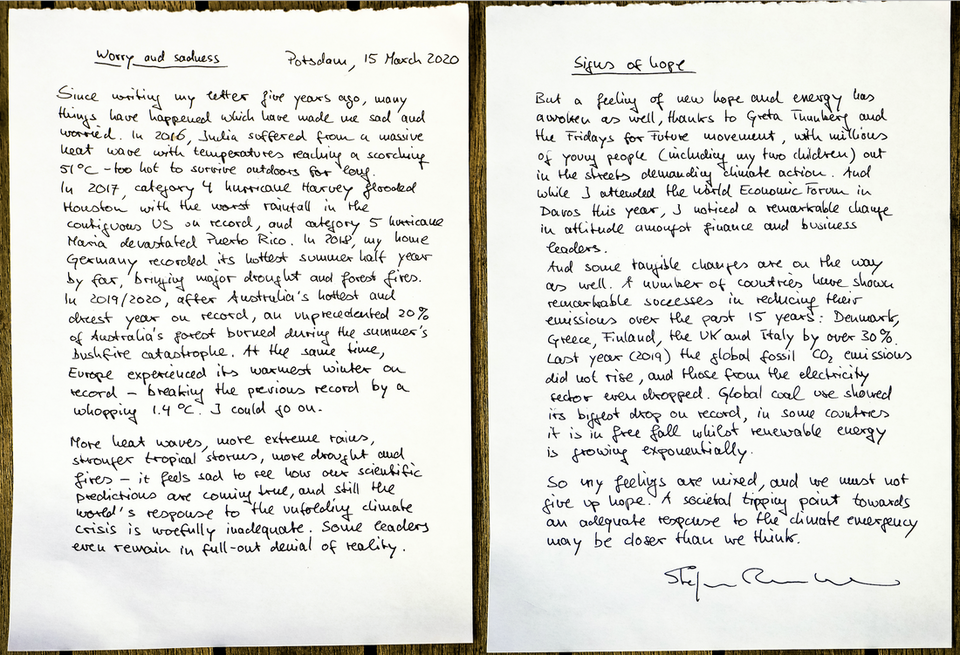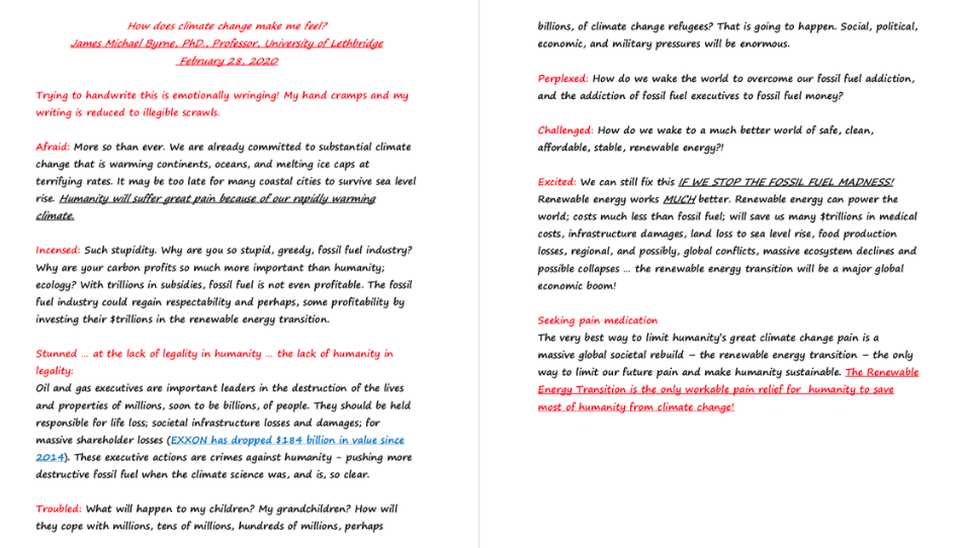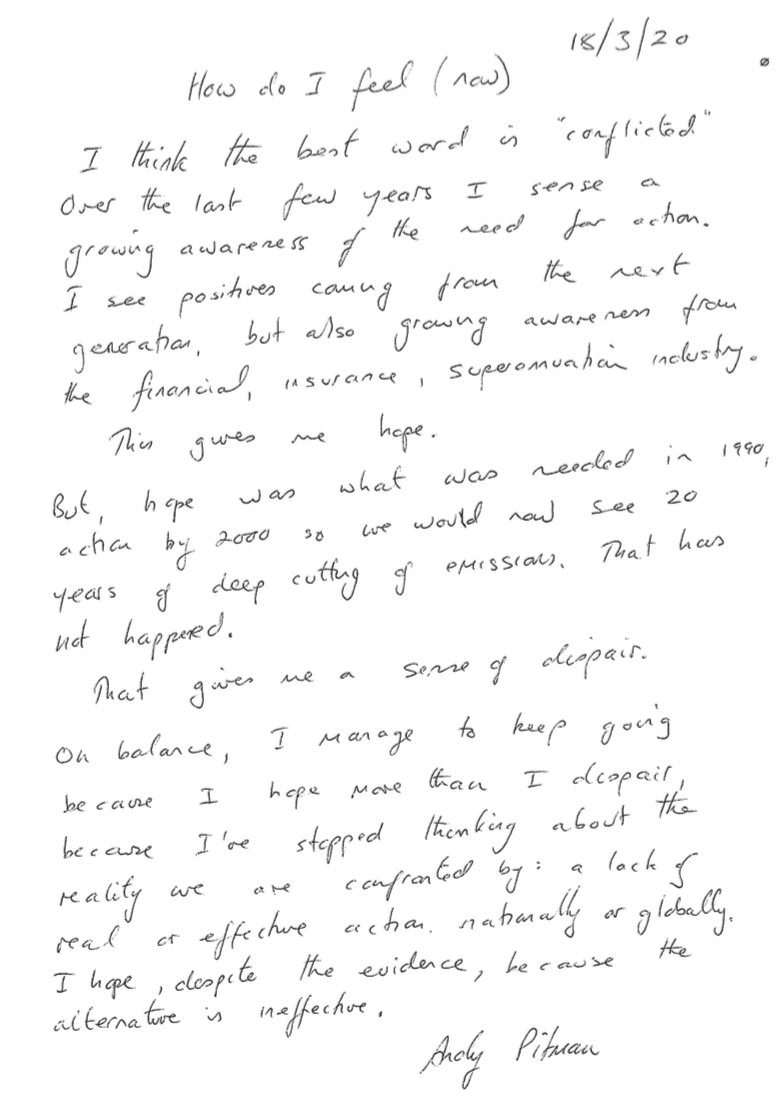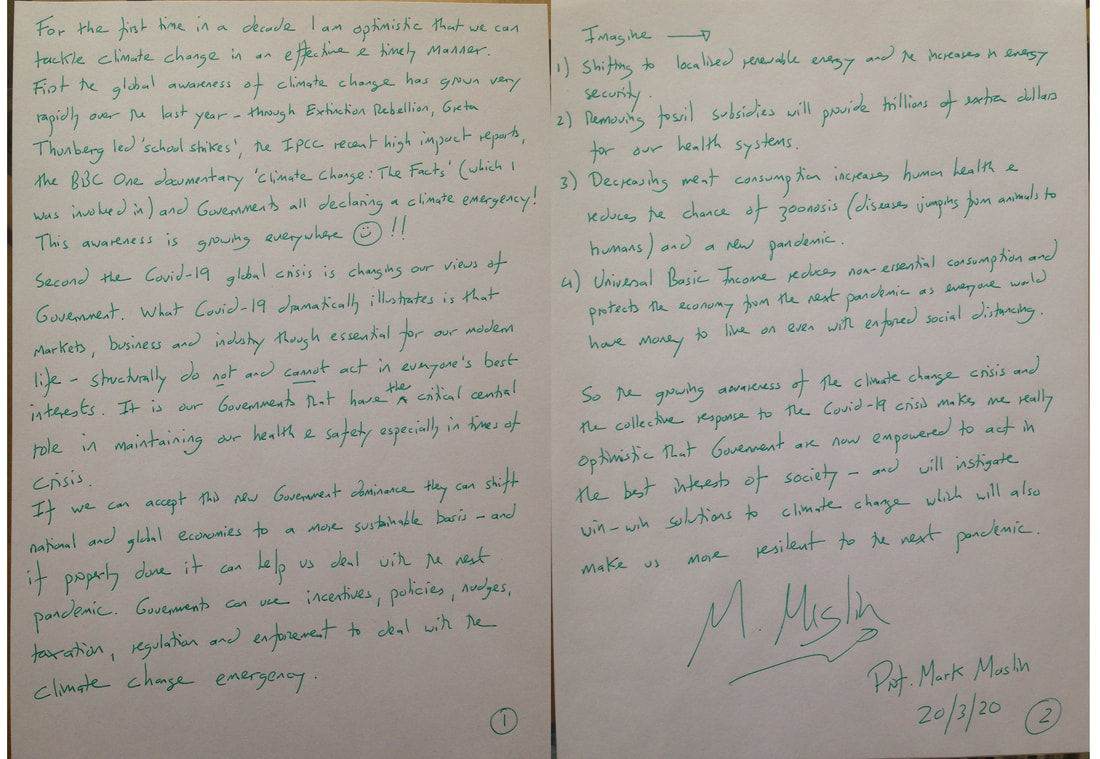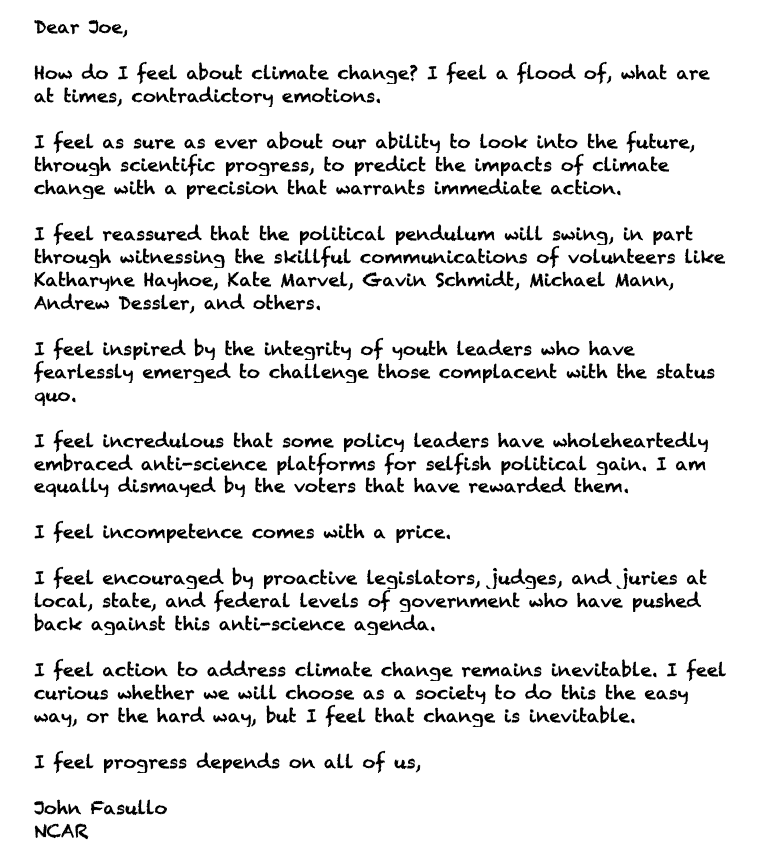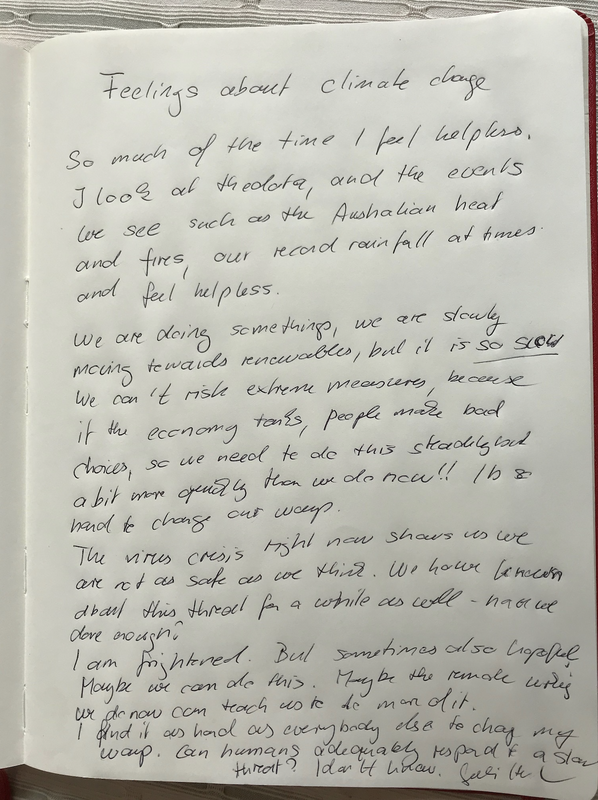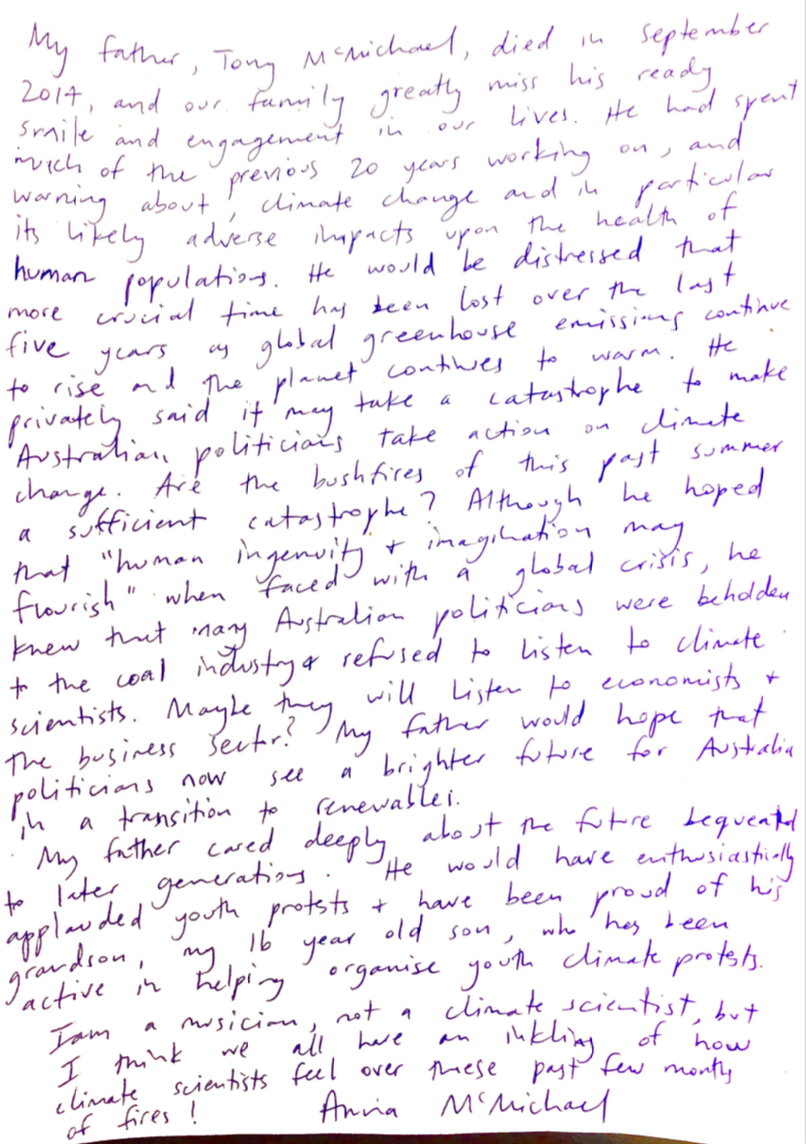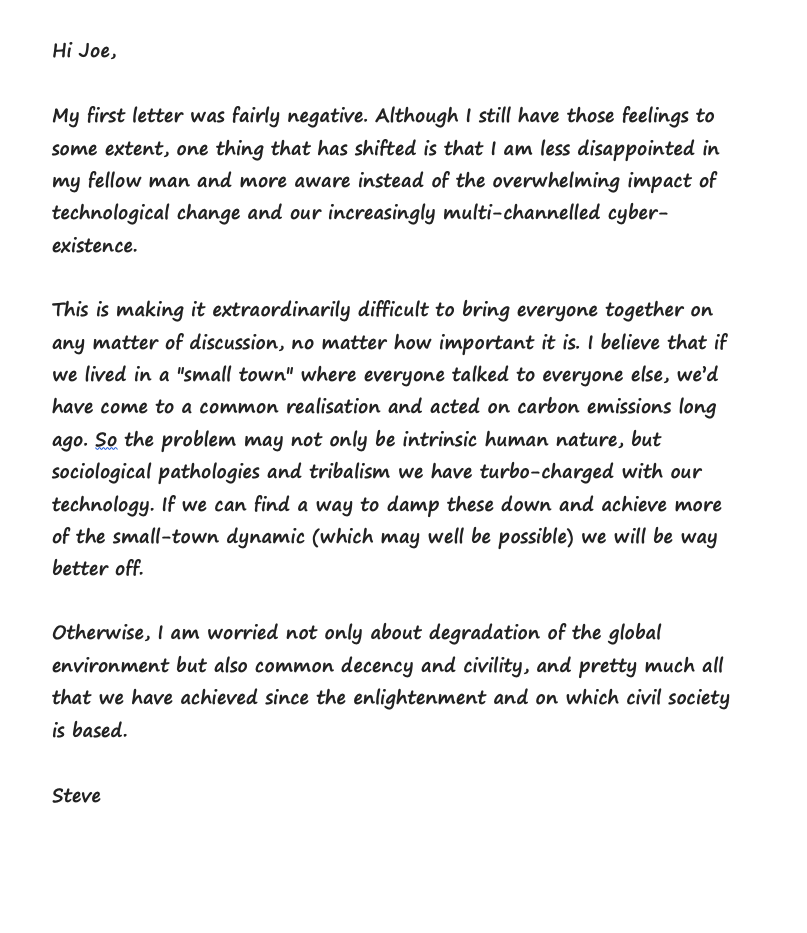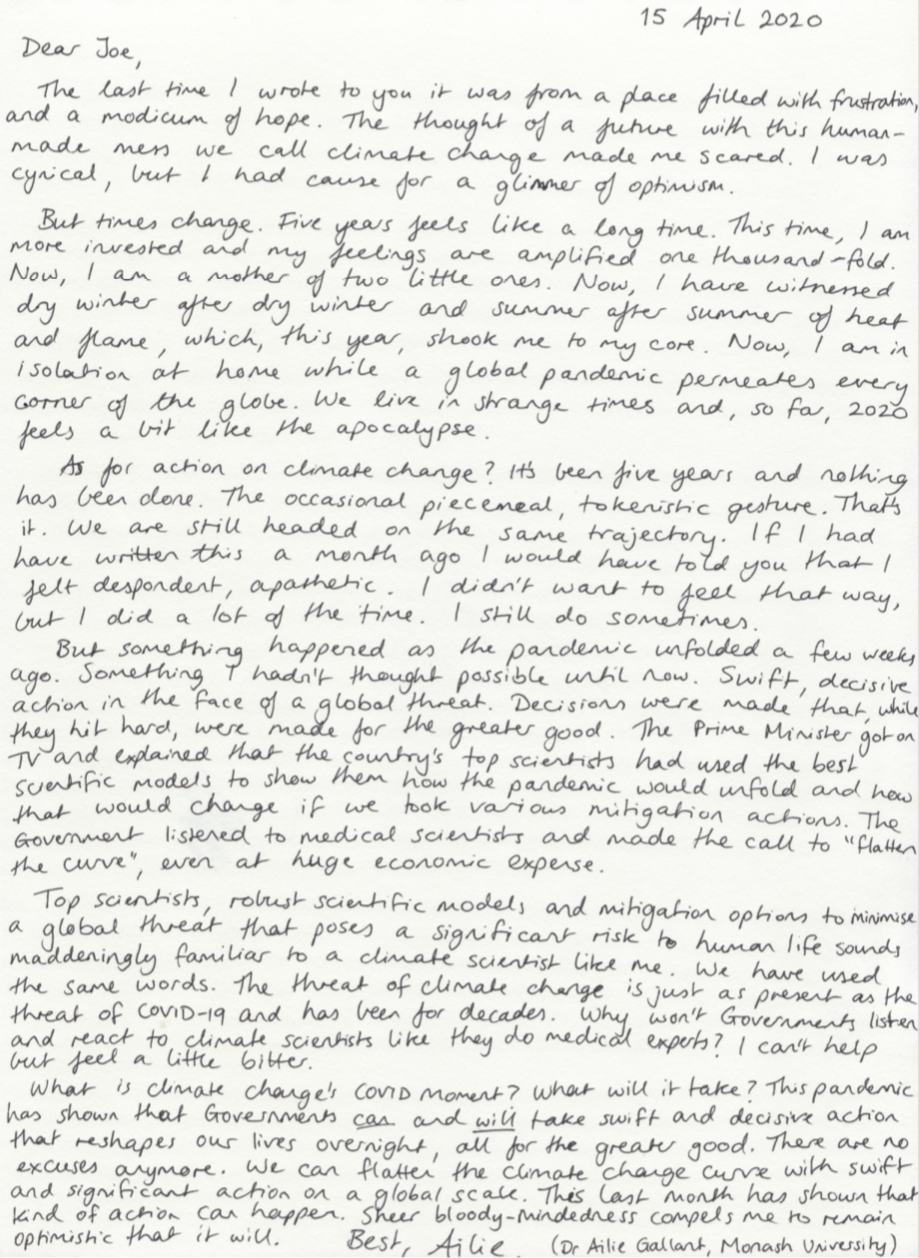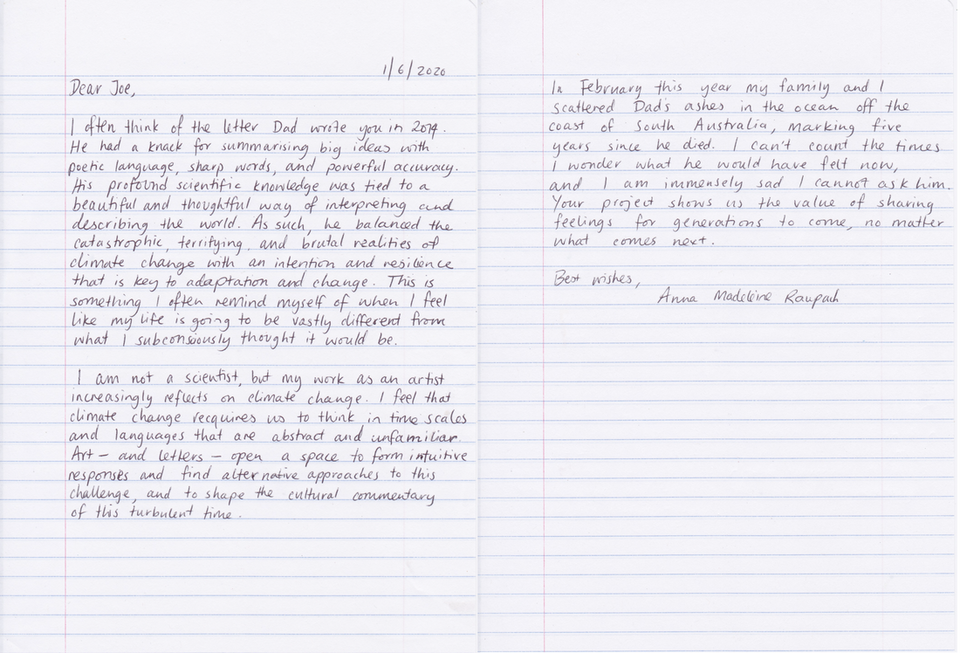ITHYF5
Below are the words of the original contributors to Is This How You Feel? reflecting on how climate change makes them feel five years on. Check back regularly to see new letters.
Professor Katrin Meissner
Director, Climate Change Research Centre
University of New South Wales
Director, Climate Change Research Centre
University of New South Wales
Dear Joe,
Thank you for asking how I feel now, five years after my initials letter. A lot has happened in these past five years.
The public is more aware of climate change, thanks to Greta. The Paris Agreement has been a success story. But with today's emission reduction targets we will miss the 1.5-2°C guardrail agreed upon. The targets are not ambitious enough.
Unfortunately, many people have been directly impacted by already occurring climate change during these past five years. Meanwhile, CO2 concentrations continued to rise at much faster rates than ever recorded in the planet's natural climate history. We do not know how ecosystems will adapt to these fast changes.
The climate system is slow to react, mainly due to the ocean's large heat capacity. It is still trying to adjust to our current CO2 concentrations. This inertia means that there is no emergency break for us.
Imagine, for example, that changes become so disruptive that we decide to act drastically and quickly. The inertia in the system will prevent us from reversing the warming rapidly. In addition, some of the changes won't be reversible at all on human timescales once they happened, such as the destabilization and melting of ice sheets, the acidification of our oceans, or the deterioration of coral reefs.
The warming we see now is the result of decisions that have been taken years ago. And the decisions we take now will impact our children and grandchildren.
How do I feel about it? I am still very worried. I am also profoundly sad. I am probably sadder than I was five years ago. I feel powerless and, to a certain extent, guilty. I feel like I have failed my duty as a citizen and as a mother because I was not able to communicate the urgency of the situation well enough to trigger meaningful action in time.
What we are doing right now is an uncontrolled, risky experiment with the planet we live on.
There is unfortunately nothing intelligent about this behaviour.
I hope you are well,
Best Wishes
Prof Katrin Meissner
Click here to see Katrin's original letter
Thank you for asking how I feel now, five years after my initials letter. A lot has happened in these past five years.
The public is more aware of climate change, thanks to Greta. The Paris Agreement has been a success story. But with today's emission reduction targets we will miss the 1.5-2°C guardrail agreed upon. The targets are not ambitious enough.
Unfortunately, many people have been directly impacted by already occurring climate change during these past five years. Meanwhile, CO2 concentrations continued to rise at much faster rates than ever recorded in the planet's natural climate history. We do not know how ecosystems will adapt to these fast changes.
The climate system is slow to react, mainly due to the ocean's large heat capacity. It is still trying to adjust to our current CO2 concentrations. This inertia means that there is no emergency break for us.
Imagine, for example, that changes become so disruptive that we decide to act drastically and quickly. The inertia in the system will prevent us from reversing the warming rapidly. In addition, some of the changes won't be reversible at all on human timescales once they happened, such as the destabilization and melting of ice sheets, the acidification of our oceans, or the deterioration of coral reefs.
The warming we see now is the result of decisions that have been taken years ago. And the decisions we take now will impact our children and grandchildren.
How do I feel about it? I am still very worried. I am also profoundly sad. I am probably sadder than I was five years ago. I feel powerless and, to a certain extent, guilty. I feel like I have failed my duty as a citizen and as a mother because I was not able to communicate the urgency of the situation well enough to trigger meaningful action in time.
What we are doing right now is an uncontrolled, risky experiment with the planet we live on.
There is unfortunately nothing intelligent about this behaviour.
I hope you are well,
Best Wishes
Prof Katrin Meissner
Click here to see Katrin's original letter
Dr Agus Santoso
Senior Research Associate
University of New South Wales
Senior Research Associate
University of New South Wales
Dear Joe,
I am more hopeful that the world will eventually come together to act on climate change. But the longer the delay, the greater the impact will be which is to be committed for several decades and even centuries to come, even if we fully act today. So I'm afraid that Earth's inhabitants will continue to fear the effect of anthropogenic climate change for quite a long time.
The severity will depend on how much and how soon we reduce greenhouse gas emission.
Impacts of climate change are unfolding before our eyes. Conflicts and tensions between countries are still occurring in this modern century. I feel we are living in turbulent time with man-made problems. I wish the world to be more united, to tackle global challenges. No matter what, we shall persist doing our best and keep hopes alive for a better future.
Sincerely,
Agus Santoso
Senior Researcher, UNSW
Click here to see Agus's original letter
I am more hopeful that the world will eventually come together to act on climate change. But the longer the delay, the greater the impact will be which is to be committed for several decades and even centuries to come, even if we fully act today. So I'm afraid that Earth's inhabitants will continue to fear the effect of anthropogenic climate change for quite a long time.
The severity will depend on how much and how soon we reduce greenhouse gas emission.
Impacts of climate change are unfolding before our eyes. Conflicts and tensions between countries are still occurring in this modern century. I feel we are living in turbulent time with man-made problems. I wish the world to be more united, to tackle global challenges. No matter what, we shall persist doing our best and keep hopes alive for a better future.
Sincerely,
Agus Santoso
Senior Researcher, UNSW
Click here to see Agus's original letter
Distinguished Professor Emeritus Richard C. J. Somerville
Scripps Institution of Oceanography
University of California, San Diego
Scripps Institution of Oceanography
University of California, San Diego
My feelings have not changed at all. You may use exactly the same contribution that you already have from me.
As an aside, I think a lot of how we feel day-to-day depends on our most recent experience. We get pessimistic if it was a negative experience, optimistic if it was positive.
I don’t think it’s very meaningful to report these rapid mood changes. If a particular politician angers or depresses (or thrills) us, he might get defeated in the next election.
What I submitted to you back then is something I feel consistently, and I think it is more significant because it doesn’t change with every transitory development.
Best regards,
Richard C. J. Somerville
Click here to see Richard's original letter
As an aside, I think a lot of how we feel day-to-day depends on our most recent experience. We get pessimistic if it was a negative experience, optimistic if it was positive.
I don’t think it’s very meaningful to report these rapid mood changes. If a particular politician angers or depresses (or thrills) us, he might get defeated in the next election.
What I submitted to you back then is something I feel consistently, and I think it is more significant because it doesn’t change with every transitory development.
Best regards,
Richard C. J. Somerville
Click here to see Richard's original letter
Dr Jennie Mallela
The Australian National University
The Australian National University
Dear Joe,
Climate Change feels very real and I think this summer we reached a tipping point in Australia. As I write this my husband, a bush fire fighter, is battling a fire in Canberra and I’m working from home as a freak hail storm destroyed my car 3 days ago. In 4 days, we’ve been smashed by our climate: hail, extreme winds, toxic smoke and fire. The preceding month has been unprecedented with bushfire smoke choking Canberra and catastrophic bushfires in New South Wales and Victoria. The last 2 weeks of school, in the lead up to Christmas my son, now 6, wasn’t allowed outside to play at school – the bushfire smoke was deemed too dangerous for them. Many Australian families with young children became “climate refugees” this summer, departing areas of fire and/or toxic air for places with “clean, safe air”. Some are yet to return. So yes, this feels very personal, very real and very frightening.
As a climate scientist I am frustrated. We have known for decades that the earth is reaching a tipping point and we have to curb, reduce and yes store, our carbon emissions. Yet Australian politicians have ignored our world leading scientists and carried on as normal and to add insult to injury actively promoted new coal mining endeavors. On bad days I feel almost paralysed with fear as I witness what we are doing to our planet and how we are condemning our children’s futures.
So, is there hope? Yes, I am encouraged when I see everyday people striking for the planet, and school children making their voices heard. As a marine scientist discussions on carbon storage and the merits of blue carbon also give me hope. Through my research I documented the climate induced coral bleaching event in 2016, and at some of my sites, where seawater temperature returned to normal I am now seeing signs of coral reef recovery. But these good news stories are in the minority. Since my last letter we have lost vast swathes of the Great Barrier Reef, seen the Amazon forest and Australian Gondwana rainforest burn. We have lost so much biodiversity on this beautiful planet of ours.
So how do I feel? Frustrated, angry that our science is ignored by politicians, scared for my husband and all the others who are on the front line fighting these fires and trying to help. But mostly I feel devastated for my son, and his generation, who will have to heal this planet and live with the mass environmental destruction we have caused.
Jennie Mallela
Click Here to see Jennie's original letter
Climate Change feels very real and I think this summer we reached a tipping point in Australia. As I write this my husband, a bush fire fighter, is battling a fire in Canberra and I’m working from home as a freak hail storm destroyed my car 3 days ago. In 4 days, we’ve been smashed by our climate: hail, extreme winds, toxic smoke and fire. The preceding month has been unprecedented with bushfire smoke choking Canberra and catastrophic bushfires in New South Wales and Victoria. The last 2 weeks of school, in the lead up to Christmas my son, now 6, wasn’t allowed outside to play at school – the bushfire smoke was deemed too dangerous for them. Many Australian families with young children became “climate refugees” this summer, departing areas of fire and/or toxic air for places with “clean, safe air”. Some are yet to return. So yes, this feels very personal, very real and very frightening.
As a climate scientist I am frustrated. We have known for decades that the earth is reaching a tipping point and we have to curb, reduce and yes store, our carbon emissions. Yet Australian politicians have ignored our world leading scientists and carried on as normal and to add insult to injury actively promoted new coal mining endeavors. On bad days I feel almost paralysed with fear as I witness what we are doing to our planet and how we are condemning our children’s futures.
So, is there hope? Yes, I am encouraged when I see everyday people striking for the planet, and school children making their voices heard. As a marine scientist discussions on carbon storage and the merits of blue carbon also give me hope. Through my research I documented the climate induced coral bleaching event in 2016, and at some of my sites, where seawater temperature returned to normal I am now seeing signs of coral reef recovery. But these good news stories are in the minority. Since my last letter we have lost vast swathes of the Great Barrier Reef, seen the Amazon forest and Australian Gondwana rainforest burn. We have lost so much biodiversity on this beautiful planet of ours.
So how do I feel? Frustrated, angry that our science is ignored by politicians, scared for my husband and all the others who are on the front line fighting these fires and trying to help. But mostly I feel devastated for my son, and his generation, who will have to heal this planet and live with the mass environmental destruction we have caused.
Jennie Mallela
Click Here to see Jennie's original letter
Dr Roger Bodman
Research fellow in climate modelling
The University of Melbourne
Research fellow in climate modelling
The University of Melbourne
Dear Joe,
Five years on, now a Research Fellow at The University of Melbourne helping to prepare the Australian contribution to CMIP6, running the latest versions of our climate models. The results show a warmer world, around 2 degrees above pre-industrial by 2040 using low emission scenarios. Even fore the low emission scenario the greenhouse gas already in the atmosphere, the heat in the ocean, the top of atmosphere energy balance, the aerosols all of these combine to create, in effect, a world committed to 2 to 2.5 defrees warmer by mid-century.
Realistically, we are already too late to meet a 1.5 degree target and will struggle to achieve 2 degrees.
So, the future, basically, looks bad. Hard to stay hopeful. Change is too slow, too late.
Yet we have to stay optimistic...
Roger Bodman, PhD
Research Fellow
University of Melbourne
Click here to see Roger's original letter
Five years on, now a Research Fellow at The University of Melbourne helping to prepare the Australian contribution to CMIP6, running the latest versions of our climate models. The results show a warmer world, around 2 degrees above pre-industrial by 2040 using low emission scenarios. Even fore the low emission scenario the greenhouse gas already in the atmosphere, the heat in the ocean, the top of atmosphere energy balance, the aerosols all of these combine to create, in effect, a world committed to 2 to 2.5 defrees warmer by mid-century.
Realistically, we are already too late to meet a 1.5 degree target and will struggle to achieve 2 degrees.
So, the future, basically, looks bad. Hard to stay hopeful. Change is too slow, too late.
Yet we have to stay optimistic...
Roger Bodman, PhD
Research Fellow
University of Melbourne
Click here to see Roger's original letter
Emiratus Professor Will Stefen
Climate Change Institute
Australian National University
Climate Change Institute
Australian National University
Letter to Joe Duggan
As the climate system continues to spiral towards a potentially uncontrollable state, I am struck with an increasing sense of both anger and apprehension. I’m angry because the lack of effective action on climate change, despite the wealth not of only scientific information but also of solutions to reduce emissions, has now created a climate emergency. The students are right. Their future is now being threatening by the greed of the wealthy fossil fuel elite, the lies of the Murdoch press, and the weakness of our political leaders. These people have no right to destroy my daughter’s future and that of her generation.
I’m apprehensive because the more we learn about climate change, the riskier it looks. Even at a 1 degree C rise in global temperature, extreme weather events are becoming more violent and dangerous than models have predicted. Over the last 5 years, our knowledge of tipping points in the Earth System has advanced rapidly, with many already showing signs of instability. Worse yet, they can interact like a row of dominoes to set off a tipping cascade, driving the Earth to hotter and more unstable conditions. That is my worst fear - that we may reach a ‘point of no return’ where we commit our children to a future of hell on Earth.
Will Steffen
16 February 2020
Click here to see Will's original letter
As the climate system continues to spiral towards a potentially uncontrollable state, I am struck with an increasing sense of both anger and apprehension. I’m angry because the lack of effective action on climate change, despite the wealth not of only scientific information but also of solutions to reduce emissions, has now created a climate emergency. The students are right. Their future is now being threatening by the greed of the wealthy fossil fuel elite, the lies of the Murdoch press, and the weakness of our political leaders. These people have no right to destroy my daughter’s future and that of her generation.
I’m apprehensive because the more we learn about climate change, the riskier it looks. Even at a 1 degree C rise in global temperature, extreme weather events are becoming more violent and dangerous than models have predicted. Over the last 5 years, our knowledge of tipping points in the Earth System has advanced rapidly, with many already showing signs of instability. Worse yet, they can interact like a row of dominoes to set off a tipping cascade, driving the Earth to hotter and more unstable conditions. That is my worst fear - that we may reach a ‘point of no return’ where we commit our children to a future of hell on Earth.
Will Steffen
16 February 2020
Click here to see Will's original letter
Professor Lesley Hughes
PVC, Research integrity and Development and Distinguished Professor of Biological Science
Macquarie University
PVC, Research integrity and Development and Distinguished Professor of Biological Science
Macquarie University
Dear Joe
Idly browsing an online newspaper, I come across an article about Antarctica just recording its highest temperature ever – over 18oC at an Argentinian research station. The piece sits there, with all the celebrity gossip, the latest political leadership wrangles, and the recipes, as if it was just a casual item of interesting news, no more or less important than anything else. It’s like a cold arrow to the heart, filling me with dread and fear, presaging doom. Why doesn’t everyone get it?
But then I also read about the UK government phasing out fossil fuel burning cars, and QLD building an even bigger battery than the one in South Australia, and yet another bank saying they won’t finance any more coal-fired power stations. And my spirits lift, at least a little.
Every newspaper, every day, sends me on an emotional rollercoaster, simultaneously plunging me into despair, and giving me just a glimmer of light, that maybe it’ll be OK after all. Maybe my kids and their kids will live to a ripe old age in health and comfort, maybe…..
Will the apocalyptic fires this summer really be the turning point? Never before have so many people had such a stark warning in their face, and in their lungs, on the TV every night, that things are different. The fires have brought out the best in our community, the extraordinary generosity if ordinary people, the courage and resilience. And they’ve brought out the worst in our so-called leaders, surely we don’t deserve them.
So how to go forward? My emotions haven’t really changed since I last wrote one of these letters, but things around me have. The beacon of light that is Greta Thunberg, speaking truth to power. Our own wonderful, passionate school kids taking to the streets, making me cry with pride.
The only way to cope with all of this is to focus on what I can do, what I’m best at, and hope like hell that enough people, doing what they do best, can overcome. I have some very dark moments, but more than ever before, I feel wrapped in a blanket of collective determination. Hope is a necessary emotion, but more than that, it must be our fundamental strategy to keep us going. Lose it, and we are lost.
Lesley
Click here to see Lesley's original letter
Idly browsing an online newspaper, I come across an article about Antarctica just recording its highest temperature ever – over 18oC at an Argentinian research station. The piece sits there, with all the celebrity gossip, the latest political leadership wrangles, and the recipes, as if it was just a casual item of interesting news, no more or less important than anything else. It’s like a cold arrow to the heart, filling me with dread and fear, presaging doom. Why doesn’t everyone get it?
But then I also read about the UK government phasing out fossil fuel burning cars, and QLD building an even bigger battery than the one in South Australia, and yet another bank saying they won’t finance any more coal-fired power stations. And my spirits lift, at least a little.
Every newspaper, every day, sends me on an emotional rollercoaster, simultaneously plunging me into despair, and giving me just a glimmer of light, that maybe it’ll be OK after all. Maybe my kids and their kids will live to a ripe old age in health and comfort, maybe…..
Will the apocalyptic fires this summer really be the turning point? Never before have so many people had such a stark warning in their face, and in their lungs, on the TV every night, that things are different. The fires have brought out the best in our community, the extraordinary generosity if ordinary people, the courage and resilience. And they’ve brought out the worst in our so-called leaders, surely we don’t deserve them.
So how to go forward? My emotions haven’t really changed since I last wrote one of these letters, but things around me have. The beacon of light that is Greta Thunberg, speaking truth to power. Our own wonderful, passionate school kids taking to the streets, making me cry with pride.
The only way to cope with all of this is to focus on what I can do, what I’m best at, and hope like hell that enough people, doing what they do best, can overcome. I have some very dark moments, but more than ever before, I feel wrapped in a blanket of collective determination. Hope is a necessary emotion, but more than that, it must be our fundamental strategy to keep us going. Lose it, and we are lost.
Lesley
Click here to see Lesley's original letter
Professor David Griggs
Monash Sustainability Institute
Monash University
Monash Sustainability Institute
Monash University
I feel exasperated that I could write the same thing as last time because nothing has changed.
I feel scared for the future when faced with simple downright ignorance from some political leaders.
I feel tired, tired that in spite of bushfires, floods etc I still seem to be banging my head against a brick wall to convince people that the threat of climate change is severe.
I feel relieved that now I am retired I don’t have to live and breathe this every minute of every day.
I feel guilty that that I am stepping back from the frontline, so even though I am retired I feel compelled to carry on working.
I feel unspeakable joy at the news that I am to become a grandfather for the first time, but fearful of the world my grandchild will grow up in.
I feel relieved that when my grandchild grows up and asks me why we did nothing to stop climate change I can at least say that I did my best.
As I sit writing this on a bench looking out over the moors I feel uplifted that despite everything the world is still the most beautiful place.
Click here to see David's original letter
I feel scared for the future when faced with simple downright ignorance from some political leaders.
I feel tired, tired that in spite of bushfires, floods etc I still seem to be banging my head against a brick wall to convince people that the threat of climate change is severe.
I feel relieved that now I am retired I don’t have to live and breathe this every minute of every day.
I feel guilty that that I am stepping back from the frontline, so even though I am retired I feel compelled to carry on working.
I feel unspeakable joy at the news that I am to become a grandfather for the first time, but fearful of the world my grandchild will grow up in.
I feel relieved that when my grandchild grows up and asks me why we did nothing to stop climate change I can at least say that I did my best.
As I sit writing this on a bench looking out over the moors I feel uplifted that despite everything the world is still the most beautiful place.
Click here to see David's original letter
Dr Kevin E Trenberth
Distinguished Scholar
National Centre for Atmospheric Research
Distinguished Scholar
National Centre for Atmospheric Research
For the most part my comments of 19 September 2014 still apply except that the glimmer of hope has diminished if not vanished entirely. With Obama as U.S. President and the Paris agreement in late 2015, a glimmer of hope seemed to emerge, but with Trump and his ignorant accomplices, the hope has vanished. I am close to retirement and as I was cleanin up in 2019 I found some old VHS tapes recording me on shows, such as the Lehrer News Hour on PBS in 1988 (for 8-9 minutes), and the message then was much the same as now except we are now more confident and the progress has been nil. It was depressing. My solution has been to move back to New Zealand along with my daughter and family (grandchildren).
See Kevin's original letter here
See Kevin's original letter here
Associate Professor Alex Sen Gupta
Climate Change Research Centre
University of New South Wales
Climate Change Research Centre
University of New South Wales
How have my feelings changed since my last letter?
Regretfully not much.
I did a radio interview recently to talk about how global warming is increasing the risc of severre bush fire. I think it is an extremely important topic as the evidence is telling us that climate change is increasingly loading the dive towards more extreme fires, and we know the devastation these fires can bring.
But in the interview not a single mention of fire! Just the same old questions around are humans really causing warming and if we are why should a small emitter like Australia care. Why haven't we moved on?
The first question has been answered a million times before (CO2 is a greenhouse gas, it traps energy, the conservation of energy dictates that CO2 must therefore cause warming - we've known this since the 19th century@ We also have direct measurement linking CO2 to warming and humans to increasing CO2). The second question is nonsense (my personal emissions are about 1 billionth of the world's emissions, so there is no point me acting, it has no measurable impact - but every individuals emissions are about 1 billionth of the total - see where I'm going? It's an argument for no action.
But some are changing.
I'm incredibly inspired by the masses of young people standing up and speaking out, unfazed by the sometimes vicious and usually ill informed abuse that it precipitates, usually from powerful old white men. How do these children have a better grasp on science, good governance and rational communication than our leaders?
The other thing that gives me hope, and the reason we will be able to avoid the worst impacts of climate change (despite our best efforts to the contrary) is that the price of renewables and storage have and are continuing to drop at amazing rates. If we haven't already, we will soon be at a point where burning fossil fuels for energy is an economic and not just environmental idiocy. But still our leaders decry these new technologies, ignoring the incredible opportunity to revitalise struggling communities, rather sending out false hope around the dying industries of the past.
Alex Sen Gupta
Climate Scientist
Click here to see Alex's original letter
Regretfully not much.
I did a radio interview recently to talk about how global warming is increasing the risc of severre bush fire. I think it is an extremely important topic as the evidence is telling us that climate change is increasingly loading the dive towards more extreme fires, and we know the devastation these fires can bring.
But in the interview not a single mention of fire! Just the same old questions around are humans really causing warming and if we are why should a small emitter like Australia care. Why haven't we moved on?
The first question has been answered a million times before (CO2 is a greenhouse gas, it traps energy, the conservation of energy dictates that CO2 must therefore cause warming - we've known this since the 19th century@ We also have direct measurement linking CO2 to warming and humans to increasing CO2). The second question is nonsense (my personal emissions are about 1 billionth of the world's emissions, so there is no point me acting, it has no measurable impact - but every individuals emissions are about 1 billionth of the total - see where I'm going? It's an argument for no action.
But some are changing.
I'm incredibly inspired by the masses of young people standing up and speaking out, unfazed by the sometimes vicious and usually ill informed abuse that it precipitates, usually from powerful old white men. How do these children have a better grasp on science, good governance and rational communication than our leaders?
The other thing that gives me hope, and the reason we will be able to avoid the worst impacts of climate change (despite our best efforts to the contrary) is that the price of renewables and storage have and are continuing to drop at amazing rates. If we haven't already, we will soon be at a point where burning fossil fuels for energy is an economic and not just environmental idiocy. But still our leaders decry these new technologies, ignoring the incredible opportunity to revitalise struggling communities, rather sending out false hope around the dying industries of the past.
Alex Sen Gupta
Climate Scientist
Click here to see Alex's original letter
Professor Nathan Bindoff
Institute of Marine and Antarctic Studies
University of Tasmania
Institute of Marine and Antarctic Studies
University of Tasmania
Five years on….
The future is close, very close, but not pre-ordained. We can still fend off the worst and most dramatic changes in the earth's weather. Changes driven by human meddling in our atmosphere.
We can still choose a better climate one more closely matched to past experience. Through existing and fresh new solutions created by human ingenuity.
BUT more than ever before, all this requires a commitment and a will to secure this grand vision of a sustainable planet at peace with us.
Nathan Bindoff 2 March 2020
Click here to see Nathan's original letter
The future is close, very close, but not pre-ordained. We can still fend off the worst and most dramatic changes in the earth's weather. Changes driven by human meddling in our atmosphere.
We can still choose a better climate one more closely matched to past experience. Through existing and fresh new solutions created by human ingenuity.
BUT more than ever before, all this requires a commitment and a will to secure this grand vision of a sustainable planet at peace with us.
Nathan Bindoff 2 March 2020
Click here to see Nathan's original letter
Dr Sarah Perkins-Kirkpatrick
Heatwaves expert/ climate scientist
Climate Change Research Centre
University of New South Wales
Heatwaves expert/ climate scientist
Climate Change Research Centre
University of New South Wales
My Dear Friend,
I wrote to you some time ago about our sick friend. It was like a type of cancer was ravaging their body. I wish I was writing to you with good news - I'm afraid I'm not.
You see, no one around us is taking us seriously, her symptoms worsen by the day, symptoms that we knew would eventually appear if we did not help her, however they are appearing sooner and with more ferocity than I thought they would. She is crying out in pain, crying out for help. So many people can help her too, they don't have to do much, but just enough - every little bit counts.
Last time I wrote I had hope that we could still save her, hope that it wasn't too late. That hope is fading, and fast. We knew this would happen, we knew she would deteriorate even further, yet we have been ignored, shunned even. I feel so sorry for my young family, they'll never know her like I did, and that's so very unfair.
I feel so lost. Some days I feel like I need to scream at the top of my lungs. "JUST DO SOMETHING!!!", but I am running out of energy. I don't want to give up though and don't worry, I wont. I'll continue fighting for her. Because if we don't, who will?
Yours,
Sarah Perkins-Kirkpatrick
Heatwaves expert/ climate scientist
Climate Change Research Centre
UNSW Sydney.
Click here to see Sarah's original letter
I wrote to you some time ago about our sick friend. It was like a type of cancer was ravaging their body. I wish I was writing to you with good news - I'm afraid I'm not.
You see, no one around us is taking us seriously, her symptoms worsen by the day, symptoms that we knew would eventually appear if we did not help her, however they are appearing sooner and with more ferocity than I thought they would. She is crying out in pain, crying out for help. So many people can help her too, they don't have to do much, but just enough - every little bit counts.
Last time I wrote I had hope that we could still save her, hope that it wasn't too late. That hope is fading, and fast. We knew this would happen, we knew she would deteriorate even further, yet we have been ignored, shunned even. I feel so sorry for my young family, they'll never know her like I did, and that's so very unfair.
I feel so lost. Some days I feel like I need to scream at the top of my lungs. "JUST DO SOMETHING!!!", but I am running out of energy. I don't want to give up though and don't worry, I wont. I'll continue fighting for her. Because if we don't, who will?
Yours,
Sarah Perkins-Kirkpatrick
Heatwaves expert/ climate scientist
Climate Change Research Centre
UNSW Sydney.
Click here to see Sarah's original letter
Professor Corey J. A. Bradshaw
Matthew Flinders Fellow in Global Ecology
Flinders University
Matthew Flinders Fellow in Global Ecology
Flinders University
Dear Joe,
Having just re-read my contribution from five years ago, I am compelled to admit that my feelings haven’t changed a lot since then.
While anger is still my over-arching emotion, my state of mind has metamorphosed from raw, potent fury into something more akin to existential malaise. As many of my colleagues have expressed better than I could, the grander realisation that climate disruption is not only real, but has immediate, negative repercussions for the state of world, is now permeating society much more than five years ago.
Yet, we remain paralysed by the legacy of decades of inaction, sustained primarily by the short-termism and financial profiteering that are central to our misnomered ‘democracy’. The corrupt political structure crafted around the pillars of resource exploitation, coupled with a massive and increasing global human population boil down to new sentiments of desperation and bleakness.
I simply cannot see how we will avoid catastrophe. The events of this summer alone are evidence of but the tip of the iceberg to come.
Few scientists in my field are still seriously considering avoidance of environmental collapse; instead, the dominant discourse is centred on damage control. Once one accepts that catastrophe is inevitable, it brings a certain clarity that fury cannot.
As a result, I have shifted to a state of deep melancholy surrounding my resentment, but it is a melancholy with a purpose — I will devote the remainder of my career and life to repairing as much of the damage as I can, while literally admitting that for the most part, I will fail.
Professor Corey J. A. Bradshaw
Matthew Flinders Fellow in Global Ecology
Flinders University
Click here to see Corey's original letter
Having just re-read my contribution from five years ago, I am compelled to admit that my feelings haven’t changed a lot since then.
While anger is still my over-arching emotion, my state of mind has metamorphosed from raw, potent fury into something more akin to existential malaise. As many of my colleagues have expressed better than I could, the grander realisation that climate disruption is not only real, but has immediate, negative repercussions for the state of world, is now permeating society much more than five years ago.
Yet, we remain paralysed by the legacy of decades of inaction, sustained primarily by the short-termism and financial profiteering that are central to our misnomered ‘democracy’. The corrupt political structure crafted around the pillars of resource exploitation, coupled with a massive and increasing global human population boil down to new sentiments of desperation and bleakness.
I simply cannot see how we will avoid catastrophe. The events of this summer alone are evidence of but the tip of the iceberg to come.
Few scientists in my field are still seriously considering avoidance of environmental collapse; instead, the dominant discourse is centred on damage control. Once one accepts that catastrophe is inevitable, it brings a certain clarity that fury cannot.
As a result, I have shifted to a state of deep melancholy surrounding my resentment, but it is a melancholy with a purpose — I will devote the remainder of my career and life to repairing as much of the damage as I can, while literally admitting that for the most part, I will fail.
Professor Corey J. A. Bradshaw
Matthew Flinders Fellow in Global Ecology
Flinders University
Click here to see Corey's original letter
Professor Stefan Rahmstorf
Head of Earth System Analysis
Potsdam Institute
Head of Earth System Analysis
Potsdam Institute
Worry and sadness
Since writing my letter five years ago, many things have happened that have made me sad and worried. In 2016, India suffered from a massive heat wave with temperatures reaching a scorching 51 °C – too hot to survive outdoors for long. In 2017, category 4 hurricane Harvey flooded Houston with the worst rainfall on record on the contiguous US, and category 5 hurricane Maria devastated Puerto Rico. In 2018, my home Germany recorded its hottest summer half year by far, bringing major drought and forest fire problems. In 2019/2020, after Australia’s hottest and driest year on record, an unprecedented 20% of Australia’s forests burned during the summer’s bushfire catastrophe. At the same time, Europe experienced its warmest winter on record – breaking the previous record by a whopping 1.4 °C. I could go on.
More heatwaves and extreme rains, stronger tropical storms, more drought and fires – it feels sad to see how our scientific predictions are coming true, and still the world’s response to the unfolding climate crisis is woefully inadequate. Some leaders even remain in full-out denial of reality.
Signs of hope
But a feeling of new hope and energy has awoken as well, thanks to Greta Thunberg and the Fridays for Future movement, with millions of young people (including my two children) out in the streets demanding climate action. And while I attended the World Economic Forum in Davos, I noticed a remarkable change of attitude amongst finance and business leaders.
And some tangible changes are on the way as well. A number of countries have shown remarkable successes in reducing their emissions over the past 15 years: Denmark, Greece, Finland, the UK and Italy by over 30%. Last year (2019), the global fossil CO2 emissions did not rise, and those from the electricity sector even dropped. Global coal use showed its biggest drop on record, in some countries it is in free fall whilst renewable energy is growing exponentially.
So my feelings are mixed, and we must not give up hope. A societal tipping point towards an adequate response to the climate emergency may be closer than we think.
Stefan Rahmstorf
Click here to see Stefan's original letter
Since writing my letter five years ago, many things have happened that have made me sad and worried. In 2016, India suffered from a massive heat wave with temperatures reaching a scorching 51 °C – too hot to survive outdoors for long. In 2017, category 4 hurricane Harvey flooded Houston with the worst rainfall on record on the contiguous US, and category 5 hurricane Maria devastated Puerto Rico. In 2018, my home Germany recorded its hottest summer half year by far, bringing major drought and forest fire problems. In 2019/2020, after Australia’s hottest and driest year on record, an unprecedented 20% of Australia’s forests burned during the summer’s bushfire catastrophe. At the same time, Europe experienced its warmest winter on record – breaking the previous record by a whopping 1.4 °C. I could go on.
More heatwaves and extreme rains, stronger tropical storms, more drought and fires – it feels sad to see how our scientific predictions are coming true, and still the world’s response to the unfolding climate crisis is woefully inadequate. Some leaders even remain in full-out denial of reality.
Signs of hope
But a feeling of new hope and energy has awoken as well, thanks to Greta Thunberg and the Fridays for Future movement, with millions of young people (including my two children) out in the streets demanding climate action. And while I attended the World Economic Forum in Davos, I noticed a remarkable change of attitude amongst finance and business leaders.
And some tangible changes are on the way as well. A number of countries have shown remarkable successes in reducing their emissions over the past 15 years: Denmark, Greece, Finland, the UK and Italy by over 30%. Last year (2019), the global fossil CO2 emissions did not rise, and those from the electricity sector even dropped. Global coal use showed its biggest drop on record, in some countries it is in free fall whilst renewable energy is growing exponentially.
So my feelings are mixed, and we must not give up hope. A societal tipping point towards an adequate response to the climate emergency may be closer than we think.
Stefan Rahmstorf
Click here to see Stefan's original letter
Professor James Byrne
University of Lethbridge
University of Lethbridge
How does climate change make me feel?
James Michael Byrne, PhD., Professor, University of Lethbridge
February 28, 2020
Trying to handwrite this is emotionally wringing! My hand cramps and my writing is reduced to illegible scrawls.
Afraid: More so than ever. We are already committed to substantial climate change that is warming continents, oceans, and melting ice caps at terrifying rates. It may be too late for many coastal cities to survive sea level rise. Humanity will suffer great pain because of our rapidly warming climate.
Incensed: Such stupidity. Why are you so stupid, greedy, fossil fuel industry? Why are your carbon profits so much more important than humanity; ecology? With trillions in subsidies, fossil fuel is not even profitable. The fossil fuel industry could regain respectability and perhaps, some profitability by investing their $trillions in the renewable energy transition.
Stunned … at the lack of legality in humanity … the lack of humanity in legality:
Oil and gas executives are important leaders in the destruction of the lives and properties of millions, soon to be billions, of people. They should be held responsible for life loss; societal infrastructure losses and damages; for massive shareholder losses (EXXON has dropped $184 billion in value since 2014). These executive actions are crimes against humanity - pushing more destructive fossil fuel when the climate science was, and is, so clear.
Troubled: What will happen to my children? My grandchildren? How will they cope with millions, tens of millions, hundreds of millions, perhaps billions, of climate change refugees? That is going to happen. Social, political, economic, and military pressures will be enormous.
Perplexed: How do we wake the world to overcome our fossil fuel addiction, and the addiction of fossil fuel executives to fossil fuel money?
Challenged: How do we wake to a much better world of safe, clean, affordable, stable, renewable energy?!
Excited: We can still fix this IF WE STOP THE FOSSIL FUEL MADNESS! Renewable energy works MUCH better. Renewable energy can power the world; costs much less than fossil fuel; will save us many $trillions in medical costs, infrastructure damages, land loss to sea level rise, food production losses, regional, and possibly, global conflicts, massive ecosystem declines and possible collapses … the renewable energy transition will be a major global economic boom!
Seeking pain medication
The very best way to limit humanity’s great climate change pain is a massive global societal rebuild – the renewable energy transition – the only way to limit our future pain and make humanity sustainable. The Renewable Energy Transition is the only workable pain relief for humanity to save most of humanity from climate change!
Click here to see Jim's original letter
James Michael Byrne, PhD., Professor, University of Lethbridge
February 28, 2020
Trying to handwrite this is emotionally wringing! My hand cramps and my writing is reduced to illegible scrawls.
Afraid: More so than ever. We are already committed to substantial climate change that is warming continents, oceans, and melting ice caps at terrifying rates. It may be too late for many coastal cities to survive sea level rise. Humanity will suffer great pain because of our rapidly warming climate.
Incensed: Such stupidity. Why are you so stupid, greedy, fossil fuel industry? Why are your carbon profits so much more important than humanity; ecology? With trillions in subsidies, fossil fuel is not even profitable. The fossil fuel industry could regain respectability and perhaps, some profitability by investing their $trillions in the renewable energy transition.
Stunned … at the lack of legality in humanity … the lack of humanity in legality:
Oil and gas executives are important leaders in the destruction of the lives and properties of millions, soon to be billions, of people. They should be held responsible for life loss; societal infrastructure losses and damages; for massive shareholder losses (EXXON has dropped $184 billion in value since 2014). These executive actions are crimes against humanity - pushing more destructive fossil fuel when the climate science was, and is, so clear.
Troubled: What will happen to my children? My grandchildren? How will they cope with millions, tens of millions, hundreds of millions, perhaps billions, of climate change refugees? That is going to happen. Social, political, economic, and military pressures will be enormous.
Perplexed: How do we wake the world to overcome our fossil fuel addiction, and the addiction of fossil fuel executives to fossil fuel money?
Challenged: How do we wake to a much better world of safe, clean, affordable, stable, renewable energy?!
Excited: We can still fix this IF WE STOP THE FOSSIL FUEL MADNESS! Renewable energy works MUCH better. Renewable energy can power the world; costs much less than fossil fuel; will save us many $trillions in medical costs, infrastructure damages, land loss to sea level rise, food production losses, regional, and possibly, global conflicts, massive ecosystem declines and possible collapses … the renewable energy transition will be a major global economic boom!
Seeking pain medication
The very best way to limit humanity’s great climate change pain is a massive global societal rebuild – the renewable energy transition – the only way to limit our future pain and make humanity sustainable. The Renewable Energy Transition is the only workable pain relief for humanity to save most of humanity from climate change!
Click here to see Jim's original letter
Professor Andy Pitman
Director of the ARC Centre of Excellence for Climate Extremes,
University of New South Wales
Director of the ARC Centre of Excellence for Climate Extremes,
University of New South Wales
How do i feel (now)
I think the best word is "conflicted"
Over the last few years I sense a growing awareness of the need for action. I see positives coming from the next generation, but also growing awareness from the financial, insurance, superannuation industry.
This gives me hope.
But, hope was what was needed in 1990, action by 2000 so we would now see 20 years of deep cutting of emissions.
That has not happened.
That gives me a sense of despair.
On balance, I manage to keep going because I hope more than I despair, Because I've stopped thinking about the reality we are confronted by: a lack of real or effective action nationally or globally.
I hope, despite the evidence, because the alternative is ineffective.
Andy Pitman.
Click here to see Andy's original letter
I think the best word is "conflicted"
Over the last few years I sense a growing awareness of the need for action. I see positives coming from the next generation, but also growing awareness from the financial, insurance, superannuation industry.
This gives me hope.
But, hope was what was needed in 1990, action by 2000 so we would now see 20 years of deep cutting of emissions.
That has not happened.
That gives me a sense of despair.
On balance, I manage to keep going because I hope more than I despair, Because I've stopped thinking about the reality we are confronted by: a lack of real or effective action nationally or globally.
I hope, despite the evidence, because the alternative is ineffective.
Andy Pitman.
Click here to see Andy's original letter
Professor Mark Maslin
University College London
University College London
For the first time in a decade I am optimistic that we can tackle climate change in an effective and timely manner. First the global awareness of climate change has grown very rapidly over the last year – through Extinction Rebellion, Greta Thunberg led schools strikes, the IPCC recent high impact reports, the BBC One documentary ‘Climate Change: The Facts’ (which I was involved in) and Governments all around the World declaring a climate emergency. This awareness is growing everywhere :) !!
Second the Covid-19 global crisis is changing our views of Governments. What Covid-19 dramatically illustrates is that markets, business and industry though essential for our modern life - structurally do not and cannot act in everyone’s best interests. It is our Governments that have the critical central role in maintaining our health and safety especially in times of crisis.
If we can accept this new Government dominance they can shift national and global economies to a more sustainable footprint – and if done properly it can help us deal with the next pandemic. Government can use incentives, policies, nudges, taxation, regulation and enforcement to deal with the climate change emergency.
Imagine
1. Shifting to localised renewable energy and the increases in energy security.
2. Removing fossil fuel subsidies will provide trillions of extra dollars for our health systems.
3.Decreasing meat consumption increases human health and reduces the chance of zoonosis (diseases jumping from animals to
humans) and a new pandemic.
4. Universal Basic Income reduces non-essential consumption and also protects the economy from the next pandemic as everyone would have money to live on even with enforced social distancing.
So the growing awareness of the climate change crisis and the collective response to the Covid-19 crisis makes me really optimistic that Governments are now empowered to act in the best interests of society - and will instigate win-win solutions to climate change which will also make us more resilient to the next pandemic.
Prof. Mark Maslin 20/3/20
Click here to see Mark's original letter
Second the Covid-19 global crisis is changing our views of Governments. What Covid-19 dramatically illustrates is that markets, business and industry though essential for our modern life - structurally do not and cannot act in everyone’s best interests. It is our Governments that have the critical central role in maintaining our health and safety especially in times of crisis.
If we can accept this new Government dominance they can shift national and global economies to a more sustainable footprint – and if done properly it can help us deal with the next pandemic. Government can use incentives, policies, nudges, taxation, regulation and enforcement to deal with the climate change emergency.
Imagine
1. Shifting to localised renewable energy and the increases in energy security.
2. Removing fossil fuel subsidies will provide trillions of extra dollars for our health systems.
3.Decreasing meat consumption increases human health and reduces the chance of zoonosis (diseases jumping from animals to
humans) and a new pandemic.
4. Universal Basic Income reduces non-essential consumption and also protects the economy from the next pandemic as everyone would have money to live on even with enforced social distancing.
So the growing awareness of the climate change crisis and the collective response to the Covid-19 crisis makes me really optimistic that Governments are now empowered to act in the best interests of society - and will instigate win-win solutions to climate change which will also make us more resilient to the next pandemic.
Prof. Mark Maslin 20/3/20
Click here to see Mark's original letter
Dr John Fasullo
Project Scientist
National Centre for Atmospheric Research
Project Scientist
National Centre for Atmospheric Research
Dear Joe,
How do I feel about climate change? I feel a flood of, what are at times, contradictory emotions.
I feel as sure as ever about our ability to look into the future, through scientific progress, to predict the impacts of climate change with a precision that warrants immediate action.
I feel reassured that the political pendulum will swing, in part through witnessing the skillful communications of volunteers like Katharyne Hayhoe, Kate Marvel, Gavin Schmidt, Michael Mann, and others.
I feel inspired by the integrity of youth leaders who have fearlessly emerged to challenge those complacent with the status quo.
I feel incredulous that some policy leaders have wholeheartedly embraced anti-science platforms for selfish political gain. I am equally dismayed by the voters that have rewarded them.
I feel incompetence comes with a price.
I feel encouraged by proactive legislators, judges, and juries at local, state, and federal levels of government who have pushed back against this anti-science agenda.
I feel action to address climate change remains inevitable. I feel curious whether we will choose as a society to do this the easy way, or the hard way, but I feel that change is inevitable.
I feel progress depends on all of us,
John Fasullo
NCAR
Click here to see John's original letter
How do I feel about climate change? I feel a flood of, what are at times, contradictory emotions.
I feel as sure as ever about our ability to look into the future, through scientific progress, to predict the impacts of climate change with a precision that warrants immediate action.
I feel reassured that the political pendulum will swing, in part through witnessing the skillful communications of volunteers like Katharyne Hayhoe, Kate Marvel, Gavin Schmidt, Michael Mann, and others.
I feel inspired by the integrity of youth leaders who have fearlessly emerged to challenge those complacent with the status quo.
I feel incredulous that some policy leaders have wholeheartedly embraced anti-science platforms for selfish political gain. I am equally dismayed by the voters that have rewarded them.
I feel incompetence comes with a price.
I feel encouraged by proactive legislators, judges, and juries at local, state, and federal levels of government who have pushed back against this anti-science agenda.
I feel action to address climate change remains inevitable. I feel curious whether we will choose as a society to do this the easy way, or the hard way, but I feel that change is inevitable.
I feel progress depends on all of us,
John Fasullo
NCAR
Click here to see John's original letter
Professor Gabi Hegerl
Professor of Climate System Science
University of Edinburgh
Professor of Climate System Science
University of Edinburgh
Feelings about climate change
So much of the time I feel helpless.
I look at the data, and the events we see such as the Australian heat and fires, our record rainfall at times, and I feel helpless.
We are doing some things, we are slowly moving towards renewables, but it is SO SLOW.
We can’t risk extreme measures, because if the economy tanks people make bad choices, so we need to do this steadily but a bit more quickly than we do now!! It's so hard to change our ways.
The virus crisis right now shows us we are not as safe as we think. We have known about this threat for a while as well – have we done enough?
I am frightened. But sometimes also hopeful. Maybe we can do this. Maybe the remote working we do now can teach us to do more of it.
I find it as hard as everybody else to change my ways. Can humans adequately respond to a slow threat?
I don’t know.
Gabi Hegerl.
Click here to see Gabi's original Letter
So much of the time I feel helpless.
I look at the data, and the events we see such as the Australian heat and fires, our record rainfall at times, and I feel helpless.
We are doing some things, we are slowly moving towards renewables, but it is SO SLOW.
We can’t risk extreme measures, because if the economy tanks people make bad choices, so we need to do this steadily but a bit more quickly than we do now!! It's so hard to change our ways.
The virus crisis right now shows us we are not as safe as we think. We have known about this threat for a while as well – have we done enough?
I am frightened. But sometimes also hopeful. Maybe we can do this. Maybe the remote working we do now can teach us to do more of it.
I find it as hard as everybody else to change my ways. Can humans adequately respond to a slow threat?
I don’t know.
Gabi Hegerl.
Click here to see Gabi's original Letter
Anna McMichael
Daughter of Professor Tony McMichael (1942-2014)
Daughter of Professor Tony McMichael (1942-2014)
My Father, Tony McMichael, died in September 2014, and our family greatly miss his ready smile and engagement in our lives. He had spent much of the previous 20 years working on, and warning people about, climate change and in particular its like adverse impacts upon the health of human populations.
He would be distressed that more crucial time has been lost over the last five years as global greenhouse emissions continue to rise and the planet continues to warm. He privately said it may take a catastrophe to make Australian politicians take action on climate change. Are the bushfires of this past summer a sufficient catastrophe?
Although he hoped that “human ingenuity and imagination may flourish” when faces with a global crisis, he knew that many Australian politicians were beholden to the coal industry and refuse to listen to the climate scientists. Maybe they will listen to the economists and the business sector? My father would hope that politicians now see a brighter future for Australia in transition to renewables.
My father cared deeply about the future bequeathed to later generations. He would have enthusiastically applauded youth protests and have been proud of his grandson my 16 year old son, who has been active in helping organise youth climate protests.
I am a musician, not a climate scientist, but I think we all have an inkling of how climate scientists feel over these past few months of fires!
Anna McMichael
Click here to see Tony's original letter
He would be distressed that more crucial time has been lost over the last five years as global greenhouse emissions continue to rise and the planet continues to warm. He privately said it may take a catastrophe to make Australian politicians take action on climate change. Are the bushfires of this past summer a sufficient catastrophe?
Although he hoped that “human ingenuity and imagination may flourish” when faces with a global crisis, he knew that many Australian politicians were beholden to the coal industry and refuse to listen to the climate scientists. Maybe they will listen to the economists and the business sector? My father would hope that politicians now see a brighter future for Australia in transition to renewables.
My father cared deeply about the future bequeathed to later generations. He would have enthusiastically applauded youth protests and have been proud of his grandson my 16 year old son, who has been active in helping organise youth climate protests.
I am a musician, not a climate scientist, but I think we all have an inkling of how climate scientists feel over these past few months of fires!
Anna McMichael
Click here to see Tony's original letter
Professor Steven Sherwood
Deputy Director, Climate Change Research Centre
University of New South Wales
Deputy Director, Climate Change Research Centre
University of New South Wales
Hi Joe,
My first letter was fairly negative. Although I still have those feelings to some extent, one thing that has shifted is that I am less disappointed in my fellow man and more aware instead of the overwhelming impact of technological change and our increasingly multi-channeled cyber-existence.
This is making it extraordinarily difficult to bring everyone together on any matter of discussion, no matter how important it is. I believe that if we lived in a "small town" where everyone talked to everyone else, we’d have come to a common realisation and acted on carbon emissions long ago. So the problem may not only be intrinsic human nature, but sociological pathologies and tribalism we have turbo-charged with our technology. If we can find a way to damp these down and achieve more of the small-town dynamic (which may well be possible) we will be way better off.
Otherwise, I am worried not only about degradation of the global environment but also common decency and civility, and pretty much all that we have achieved since the enlightenment and on which civil society is based.
Steve
Click here to see Steve's original letter
My first letter was fairly negative. Although I still have those feelings to some extent, one thing that has shifted is that I am less disappointed in my fellow man and more aware instead of the overwhelming impact of technological change and our increasingly multi-channeled cyber-existence.
This is making it extraordinarily difficult to bring everyone together on any matter of discussion, no matter how important it is. I believe that if we lived in a "small town" where everyone talked to everyone else, we’d have come to a common realisation and acted on carbon emissions long ago. So the problem may not only be intrinsic human nature, but sociological pathologies and tribalism we have turbo-charged with our technology. If we can find a way to damp these down and achieve more of the small-town dynamic (which may well be possible) we will be way better off.
Otherwise, I am worried not only about degradation of the global environment but also common decency and civility, and pretty much all that we have achieved since the enlightenment and on which civil society is based.
Steve
Click here to see Steve's original letter
Dr Ailie Gallant
Senior Lecturer, School of Earth, Atmosphere and Environment, Monash University
Associate Investigator, ARC Centre of Excellence for Climate Extremes
Senior Lecturer, School of Earth, Atmosphere and Environment, Monash University
Associate Investigator, ARC Centre of Excellence for Climate Extremes
Dear Joe,
The last time I wrote to you it was from a place filled with frustration, and a modicum of hope. The thought of a future with this human-made mess we call climate change made me scared. I was cynical, but I had cause for a glimmer of optimism.
But times change. Five years feels like a long time. This time, I am more invested and my feelings are amplified one thousand-fold. Now, I am a mother of two little ones. Now, I have witnessed dry winter after dry winter and summer after summer of heat and flame, which, this year, shook me to my core. Now, I am in isolation at home while a global pandemic permeates every corner of the globe. We live in strange times and, so far, 2020 feels a bit like the apocalypse.
As for action on climate change? It’s been five years and nothing has been done. The occasional piecemeal, tokenistic gesture. That’s it. We are still headed on the same trajectory. If I had have written this a month ago I would have told you that I felt despondent, apathetic. I didn’t WANT to feel that way, but I did a lot of the time. I still do sometimes.
But something happened as the pandemic unfolded a few weeks ago. Something I hadn’t thought possible until now. Swift, decisive action in the face of a global threat. Decisions were made that, while they hit hard, were made for the greater good. The Prime Minister got on TV and explained that the country’s top scientists had used the best scientific models to show them how the pandemic would unfold and how that would change if we took various mitigating actions. The Government listened to medical scientists and made the call to “flatten the curve”, even at huge economic expense.
Top scientists, robust scientific models and mitigation options to minimise a global threat that poses a significant risk to human life sounds maddeningly familiar to a climate scientist like me. We have used the same words. The threat of climate change is just as present as the threat from COVID-19 and has been for decades. Why won’t Governments listen and react to climate scientists like they do to medical experts? I can’t help but feel a little bitter.
What is climate change’s COVID moment? What will it take? This pandemic has shown us that Governments can and will take swift and decisive action that reshapes our lives overnight, all for the greater good. There are no excuses anymore. We can flatten the climate change curve with swift and significant action on a global scale. This last month has shown that kind of action can happen. Sheer bloody-mindedness compels me to remain optimistic that it will.
Best,
Ailie
Dr Ailie Gallant
Senior Lecturer
School of Earth, Atmosphere and Environment
Monash University
Click here to see Ailie's original letter
The last time I wrote to you it was from a place filled with frustration, and a modicum of hope. The thought of a future with this human-made mess we call climate change made me scared. I was cynical, but I had cause for a glimmer of optimism.
But times change. Five years feels like a long time. This time, I am more invested and my feelings are amplified one thousand-fold. Now, I am a mother of two little ones. Now, I have witnessed dry winter after dry winter and summer after summer of heat and flame, which, this year, shook me to my core. Now, I am in isolation at home while a global pandemic permeates every corner of the globe. We live in strange times and, so far, 2020 feels a bit like the apocalypse.
As for action on climate change? It’s been five years and nothing has been done. The occasional piecemeal, tokenistic gesture. That’s it. We are still headed on the same trajectory. If I had have written this a month ago I would have told you that I felt despondent, apathetic. I didn’t WANT to feel that way, but I did a lot of the time. I still do sometimes.
But something happened as the pandemic unfolded a few weeks ago. Something I hadn’t thought possible until now. Swift, decisive action in the face of a global threat. Decisions were made that, while they hit hard, were made for the greater good. The Prime Minister got on TV and explained that the country’s top scientists had used the best scientific models to show them how the pandemic would unfold and how that would change if we took various mitigating actions. The Government listened to medical scientists and made the call to “flatten the curve”, even at huge economic expense.
Top scientists, robust scientific models and mitigation options to minimise a global threat that poses a significant risk to human life sounds maddeningly familiar to a climate scientist like me. We have used the same words. The threat of climate change is just as present as the threat from COVID-19 and has been for decades. Why won’t Governments listen and react to climate scientists like they do to medical experts? I can’t help but feel a little bitter.
What is climate change’s COVID moment? What will it take? This pandemic has shown us that Governments can and will take swift and decisive action that reshapes our lives overnight, all for the greater good. There are no excuses anymore. We can flatten the climate change curve with swift and significant action on a global scale. This last month has shown that kind of action can happen. Sheer bloody-mindedness compels me to remain optimistic that it will.
Best,
Ailie
Dr Ailie Gallant
Senior Lecturer
School of Earth, Atmosphere and Environment
Monash University
Click here to see Ailie's original letter
Anna Raupach
Daughter of Professor Michael Raupach (1950-2015)
Daughter of Professor Michael Raupach (1950-2015)
Dear Joe
I often think of the letter Dad wrote you in 2014. He had a knack for summarising big ideas with poetic language, sharp words, and powerful accuracy. His profound scientific knowledge was tied to a beautiful and thoughtful way of interpreting and describing the world. As such, he balanced the catastrophic, terrifying and brutal realities of climate change with an intention and resilience that is key to adaptation and change. This is something I often remind myself of when I feel like my life is going to be vastly different from what I subconsciously thought it would be.
I am not a scientist, but my work as an artist increasingly reflects on climate change. I feel that climate change requires us to think in time scales and languages that are abstract and unfamiliar. Art – and letters – open a space to form intuitive responses and find alternative approaches to this challenge, and to shape the cultural commentary of this turbulent time.
In February this year my family and I scattered Dad’s ashes in the ocean of the coast of South Australia, marking five years since he died. I can’t count the times I wonder what he would have felt now, and I am immensely sad I cannot ask him.
Your project shows us the value of sharing feelings for generations to come, no matter what comes next.
Best wishes,
Anna Madeleine Raupach.
Click here to see Michael Raupach's original letter
I often think of the letter Dad wrote you in 2014. He had a knack for summarising big ideas with poetic language, sharp words, and powerful accuracy. His profound scientific knowledge was tied to a beautiful and thoughtful way of interpreting and describing the world. As such, he balanced the catastrophic, terrifying and brutal realities of climate change with an intention and resilience that is key to adaptation and change. This is something I often remind myself of when I feel like my life is going to be vastly different from what I subconsciously thought it would be.
I am not a scientist, but my work as an artist increasingly reflects on climate change. I feel that climate change requires us to think in time scales and languages that are abstract and unfamiliar. Art – and letters – open a space to form intuitive responses and find alternative approaches to this challenge, and to shape the cultural commentary of this turbulent time.
In February this year my family and I scattered Dad’s ashes in the ocean of the coast of South Australia, marking five years since he died. I can’t count the times I wonder what he would have felt now, and I am immensely sad I cannot ask him.
Your project shows us the value of sharing feelings for generations to come, no matter what comes next.
Best wishes,
Anna Madeleine Raupach.
Click here to see Michael Raupach's original letter
